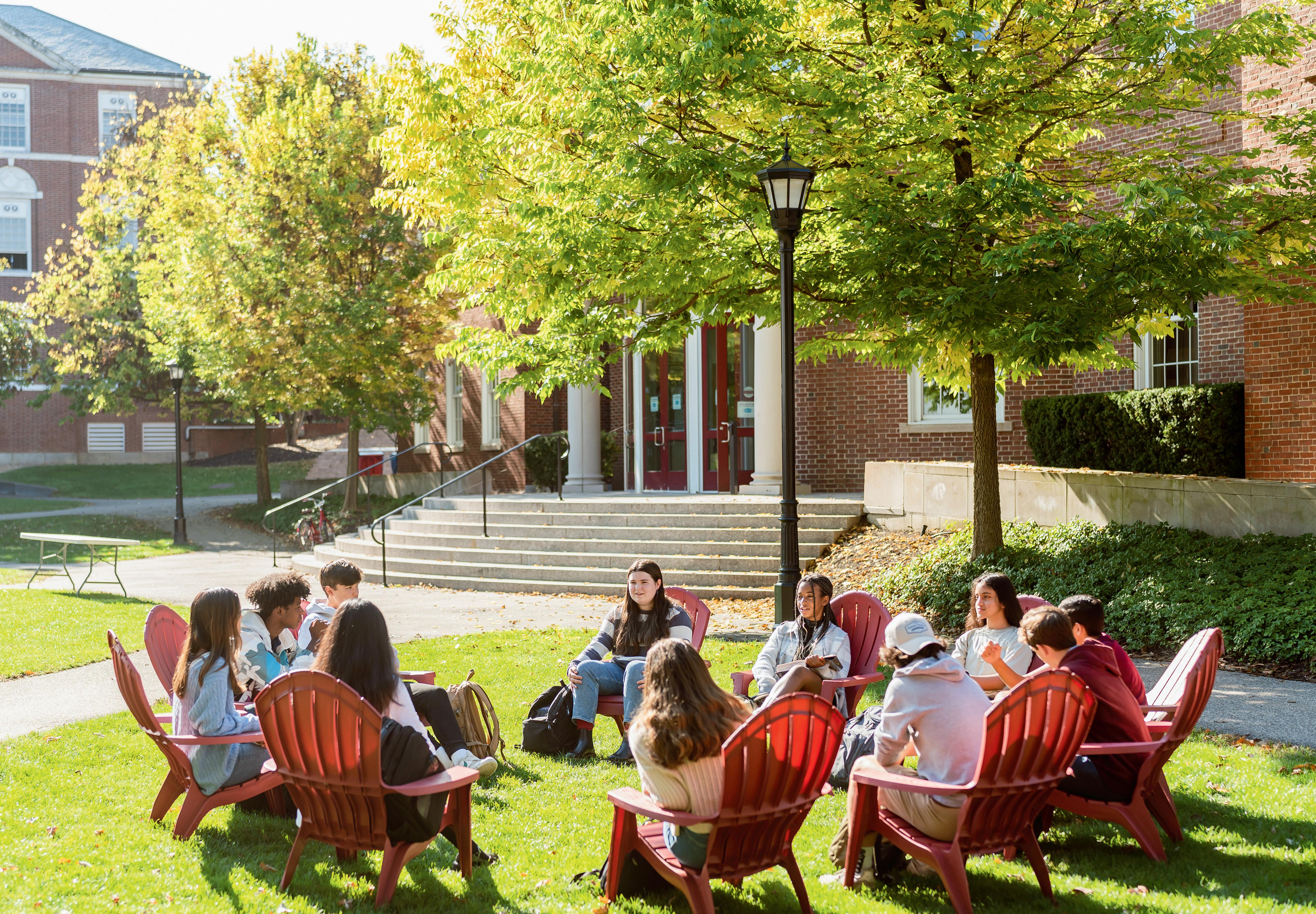
“Being part of this community changed me.”
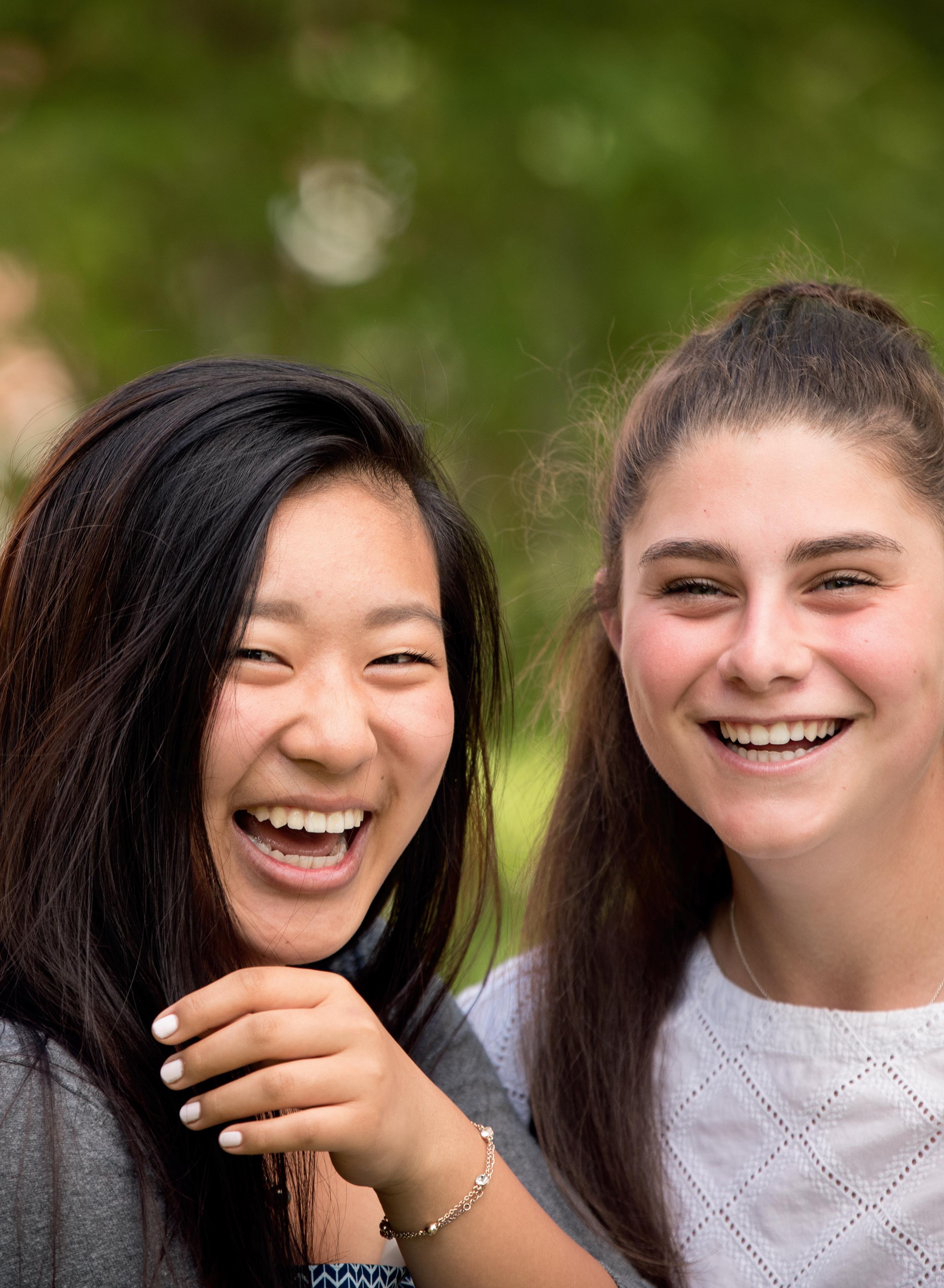


“Being part of this community changed me.”

We’re a community. Our students come from 42 countries and 44 states to live and learn together in exciting, surprising, often transformative ways. For day students and boarding students, our campus is a second home.
We live Harkness. We pioneered the Harkness method of teaching, which gives students the power — and the responsibility — to fully engage in discussions, in and out of class. Our culture is a Harkness culture, where every voice matters.
We are committed to need-blind admissions. A family’s income will never be a factor in our admission process. We meet 100% of the demonstrated financial need of every admitted student, and approximately 50% of our students receive financial assistance each year.
We seek out new opportunities. At Exeter, learning is about challenging yourself, exploring the unfamiliar, discovering new passions — and feeling uplifted by the support of your friends and your teachers and advisers.
We pursue excellence in everything we do. The pursuit is joyful, intense and endlessly rewarding. It’s about personal achievement — and contributing to the common good.
There are many, many more things to know about Exeter. We asked more than two dozen members of the Exeter community to talk about some of them in this book. The great thing about Exeter is that this is just the beginning.
Caroline: “The students are the most amazing, genuine, hardworking people. And we’re all going through this experience together, so we make these really strong connections. Everyone wants you to succeed — the senior on the soccer team, the teacher from a past term. You have so many support systems around you.”
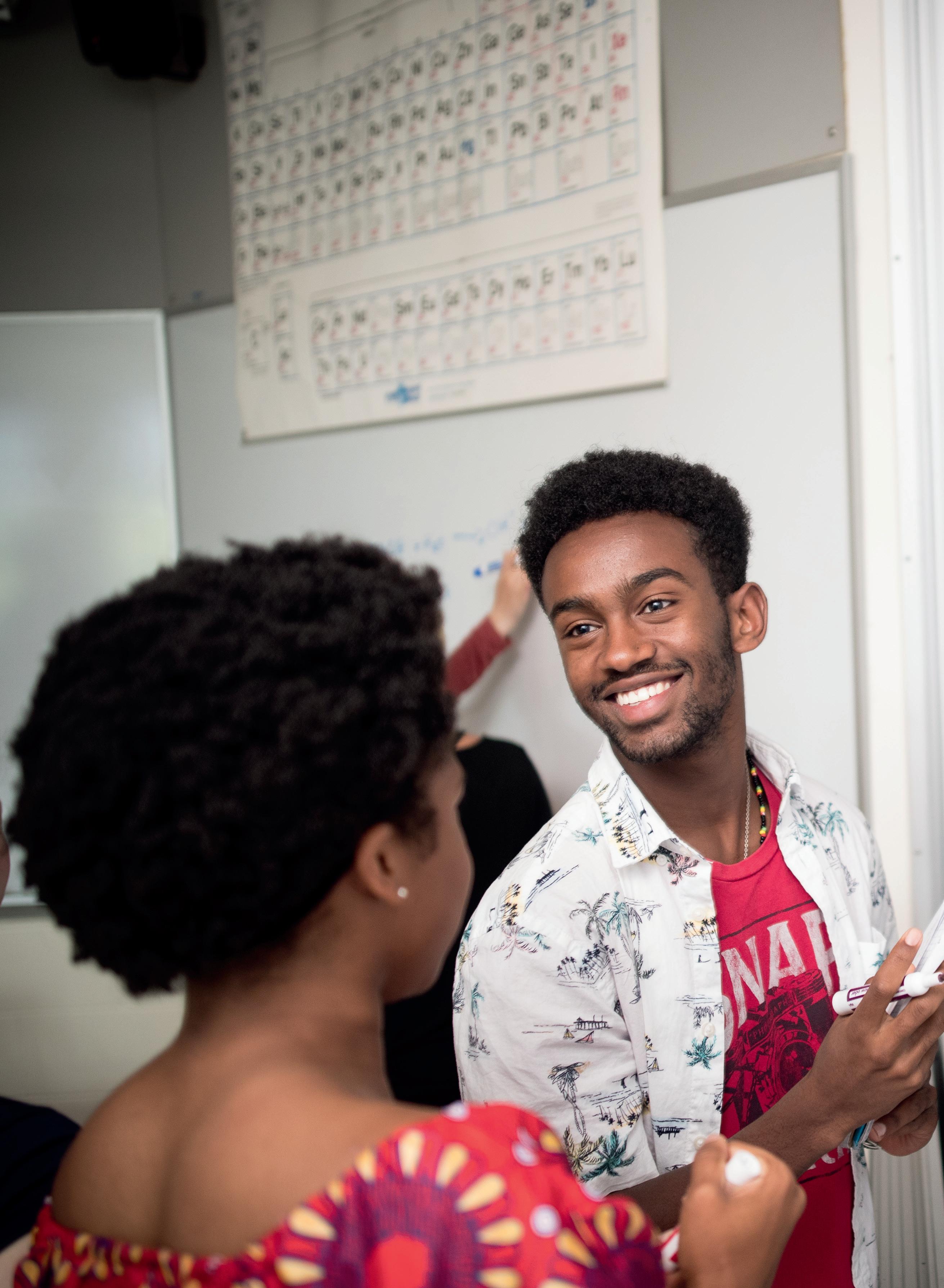
One of our founding ideals: a commitment to serve students from all walks of life. Our students come to Exeter with a vast variety of stories and cultures and ways of thinking — which leads to a pretty mindblowing high school experience. Diverse communities ask smarter questions, get better answers and produce innovative
solutions. Rachael: “Being part of this community changed me. My country — South Korea — is ethnically homogenous. Exeter has people from so many different backgrounds, so I’ve had to think differently, debate in a different way and basically expand my idea of what’s possible.”
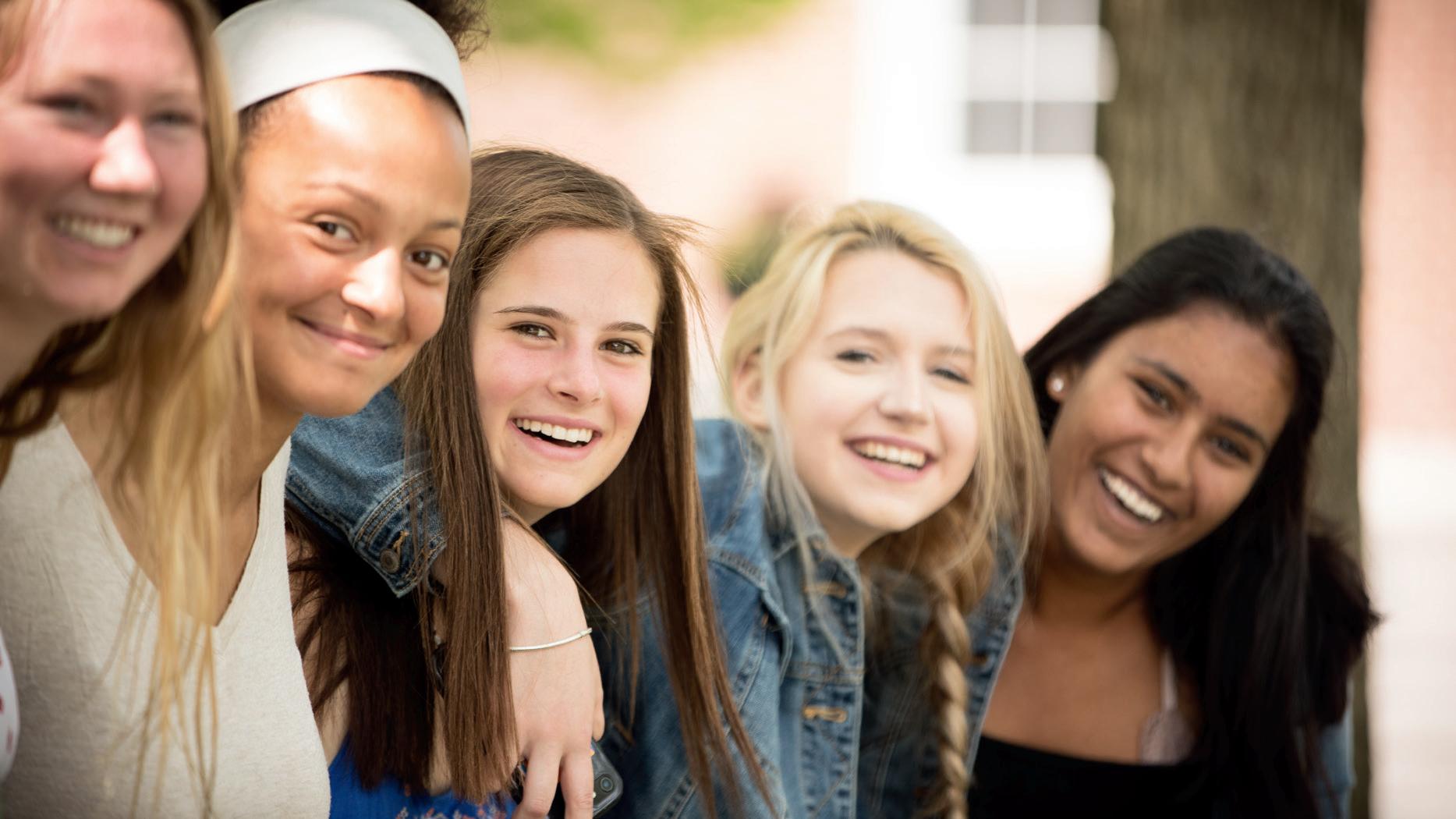
Unexpected acts of pure generosity
Aiden: “I remember in the fall of my first year, I had an essay due for Greek history. I was kind of uncertain about it. There was a kid on my floor, an older student; I’d only known him for a couple of weeks. I showed the essay to him. It was totally wrong. So he stayed up late, helping me write a proper history essay. The class was pass/fail, so this wasn’t about the grade. He was just being incredibly generous to a younger student.”
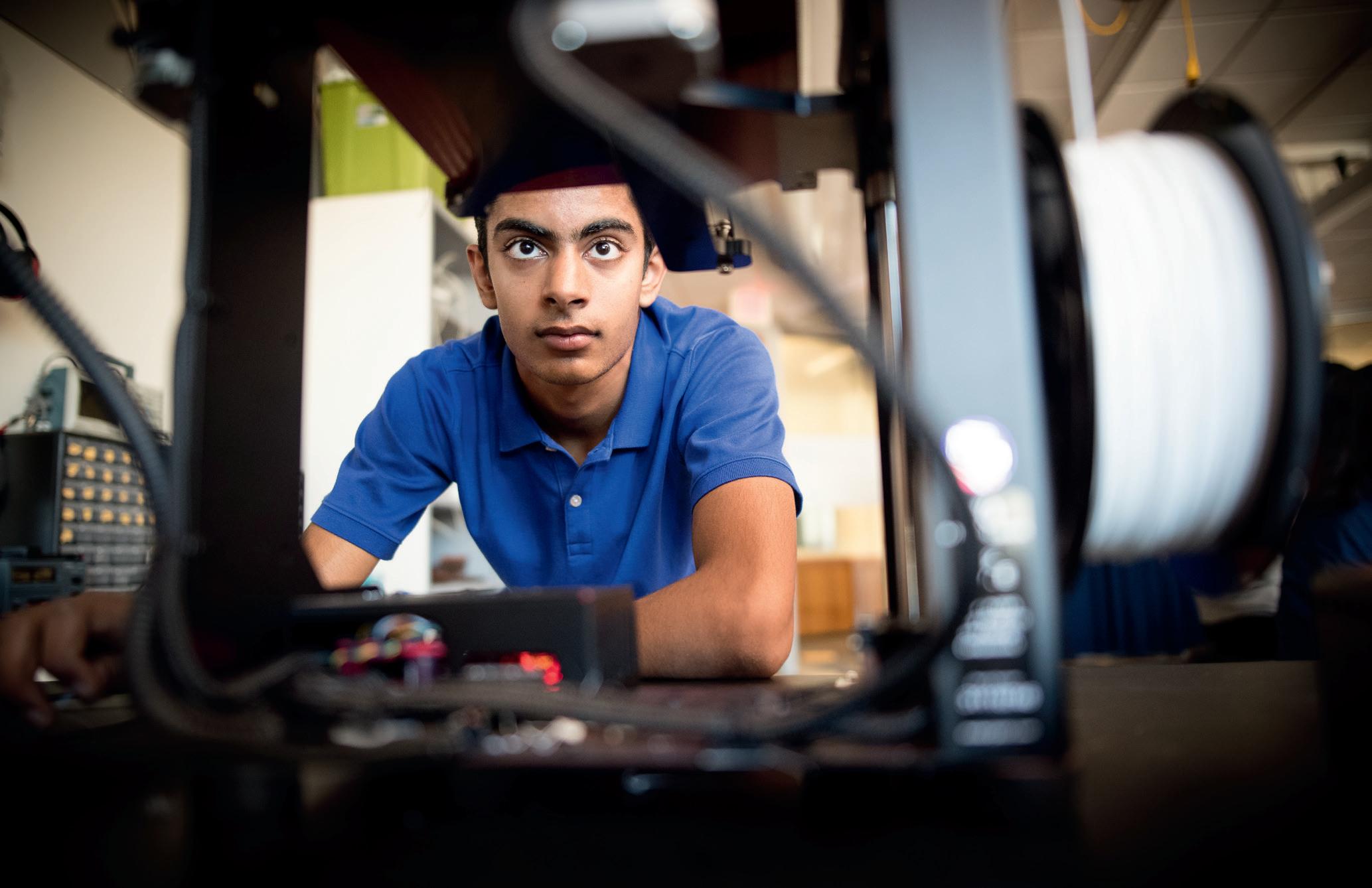
Emilio: “I took a 500-level anthropology course as a 10th grader. The teacher’s classroom was old-school, with wood paneling and a green lampshade on his desk lamp. We studied institutions and how they shape people — focusing on Exeter itself. That was a moment where I felt like: ‘Wow, I’m an academic.’ People here just love learning. Everyone is so interested in everything, so excited to talk at such a high level.”
Michael: “I’m taking a class called Peoples and Cultures of the Modern World. It’s so much deeper than any class I took before. It’s a whole new world. The issues are complicated, and the work takes serious thought. But to me, that’s actually fun.”
Teachers who get paid to innovate
Ms. Hernandez: “I’m one of eight biology instructors, and they’re all supertalented. I’m routinely inspired and pushed and challenged by my colleagues. The school has the resources to let us innovate. There’s even a fund in the Science Department that lets us come up with ideas that are likely to fail. That ends up benefiting students. They see us experimenting and taking risks. We don’t always succeed, but we love the process.”
Embracing a challenge
Mr. Weatherspoon: “The more willing you are to embrace a challenge, the more eager you are to collaborate, the more inquisitive and open-minded you are, the more Exeter will make sense to you.”
Engaging with the big issues
Caroline: “I remember a biology class in my first year — I’d never seen a teacher who was so excited to teach biology. The energy he brought to class was incredible. And everything we studied — climate change, ocean acidification — was applicable to the world outside. You felt inspired to go make change.”
Finding joy in the pursuit
Melanie: “I remember taking a class with a renowned math teacher. It was the last period of the day, it was winter, everyone was hungry — but we all stayed late, working at this one problem. And we finally got it. That kind of experience bonds you.”
The 333
A legendary U.S. history course. Every student takes it; many students are transformed by it. Tommy: “The final project is a major research paper, but the course was so much more than that. I developed a great relationship with the teacher; I still catch up with him. My paper was about the U.S.’s relationship with Saddam Hussein. I got really into it; it ended up being about 30 pages. The course pushed me in the direction of studying history in college.”
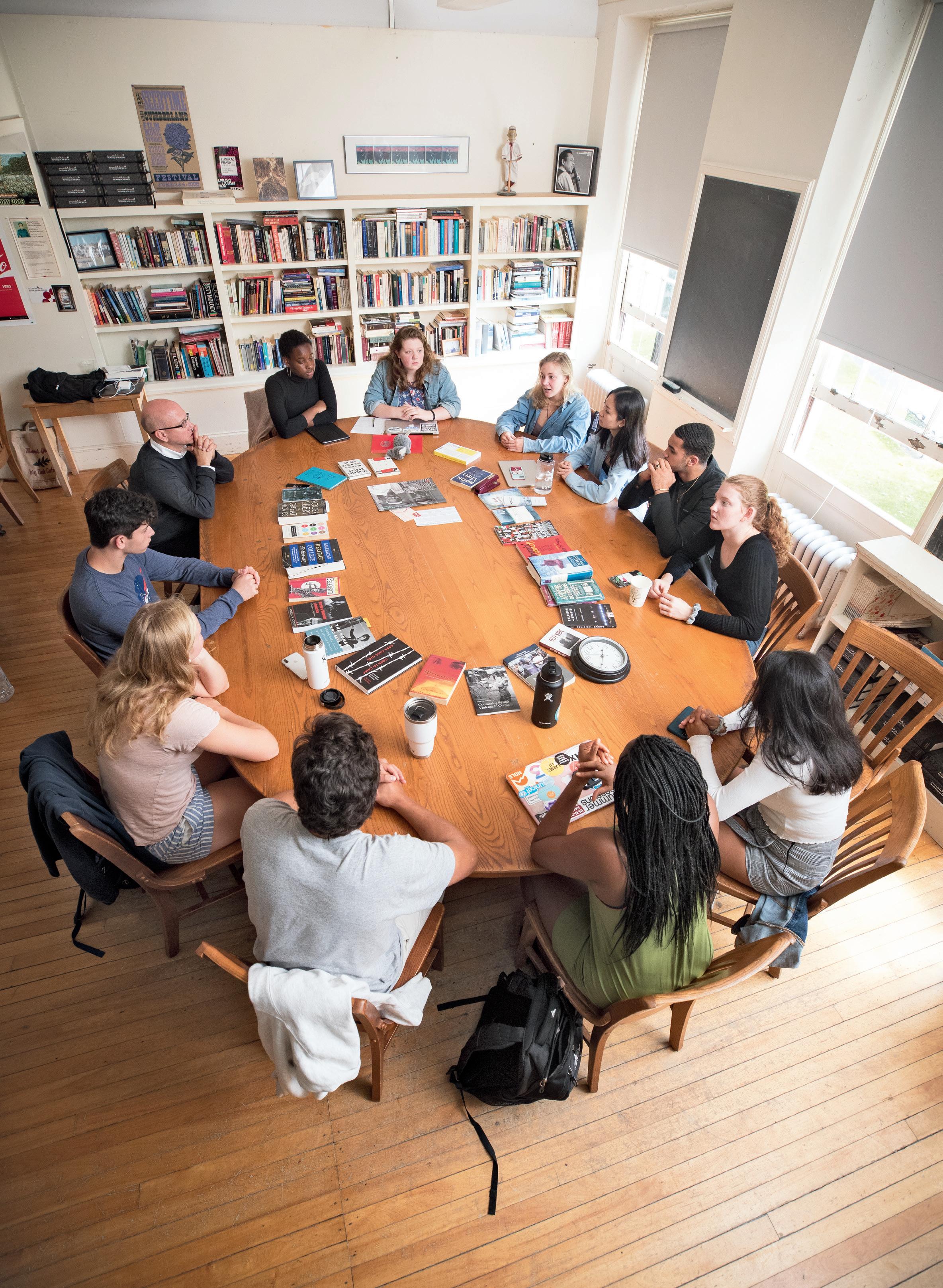
There’s one in every Exeter classroom. It’s an oblong table that seats about 12 students and a teacher. It’s also a way of being — a commitment to listening and asking questions, taking risks and being vulnerable, thinking on your feet and seeing the world from different perspectives. Kaylee: “I love learning from the people around the table. Everyone has their books out and is super-attentive. Once you understand how it works, everything changes.”
About 90% of our teachers have advanced degrees; all of them are committed to the Harkness method of teaching. It starts by giving students the responsibility for leading and sustaining discussions. Ms. Hernandez: “The way we teach elevates the student voice, gives students a space in which they’re seen, and values their identities. They’re equal partners in the learning process. That kind of agency in the classroom is pretty magical.”
We take the spirit of Harkness everywhere — including on Global Initiatives trips. Cesar: “I went to Rome with a class on spring break. A student gave a presentation at every site that we went to. Which is very Harkness: teachers coordinating a discussion in which we learn from each other.”
Adjusting on the fly
In other words: Adapting to new information. Being open to new ideas. Staying flexible. This is how we work — which happens to be how people flourish in the world. Mr. Caldwell: “We make space for students to process what they’re learning — or doing — together. When I coached rowing, I’d ask the kids in the boat to diagnose their performance at the end of practice. In a race, they were on their own. I’d stand on shore and watch them adjust to the race as it unfolded. Exeter students are remarkable at doing that in every aspect of their life: around the Harkness table, in the dorm, in a scull.”
Mr. Weatherspoon: “Harkness teaches you that a conversation isn’t a series of propositions you make while others listen. A conversation is collaborative. You build on the ideas of others. You’re always curious, open, engaged, always able to loop back and refer to something that came before. This way of talking pervades the whole scene here. It is empowering. It has long-lasting effects. In college or in their professional lives, our graduates try to re-create Harkness. They’ve seen how productive it is, how it invites everyone in.”
Students live in the same dorm throughout their time at Exeter. Every student has an adviser, usually in their dorm — an adult who knows them as a complete person, and vice versa. And the dorms are all-ages, meaning older and younger students learn from each other. All of this is intentional; our name for it is vertical housing. It allows students to flourish and grow within a web of relationships, in and out of their dorm. Mr. Weatherspoon: “Students go from being the youngest to the oldest in the same dorm. They start by looking up to the older students — and then they become the people that a new class of students looks up to.”
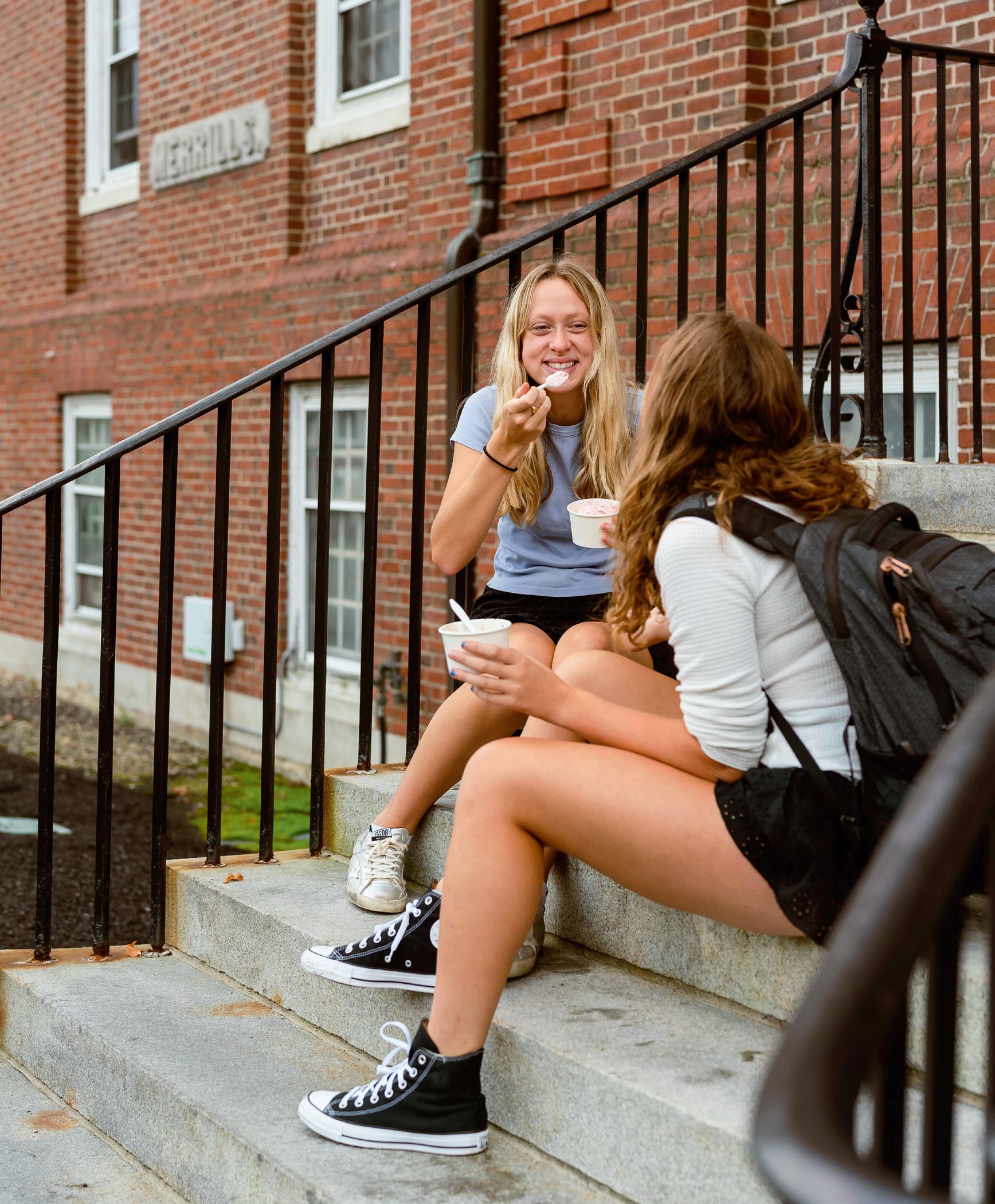
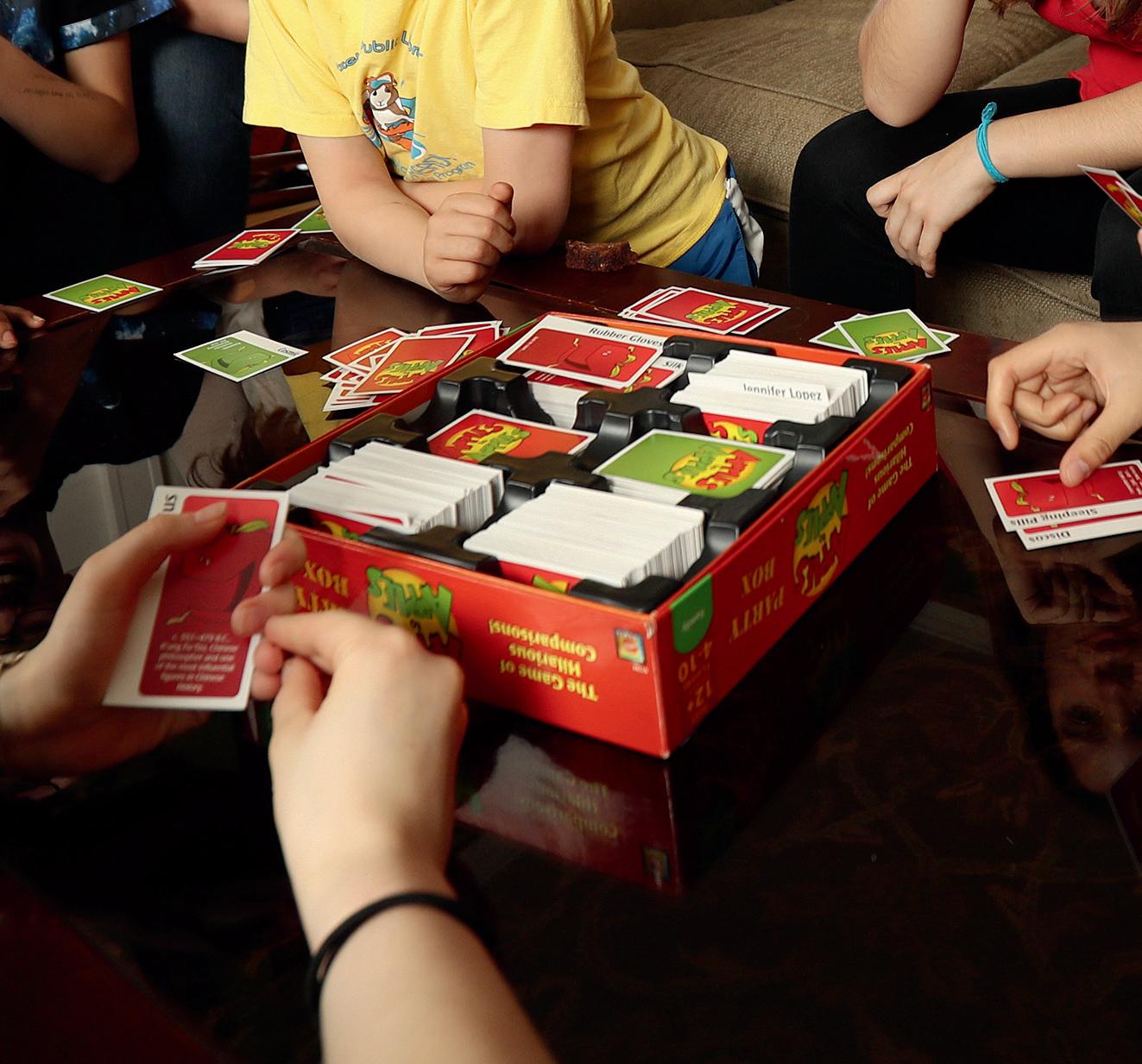
Board game night
So simple, yet so profound. One of the many social activities that a dorm might host — and one of the many opportunities to start friendships, discover something new about your neighbors and do some group bonding. Leela: “Board game night involved cookies and chocolate and Uno and Clue. But it was really a chance to interact with everyone. I was surprised at how easy it was to talk to older students — to talk about classes or ask for advice.”
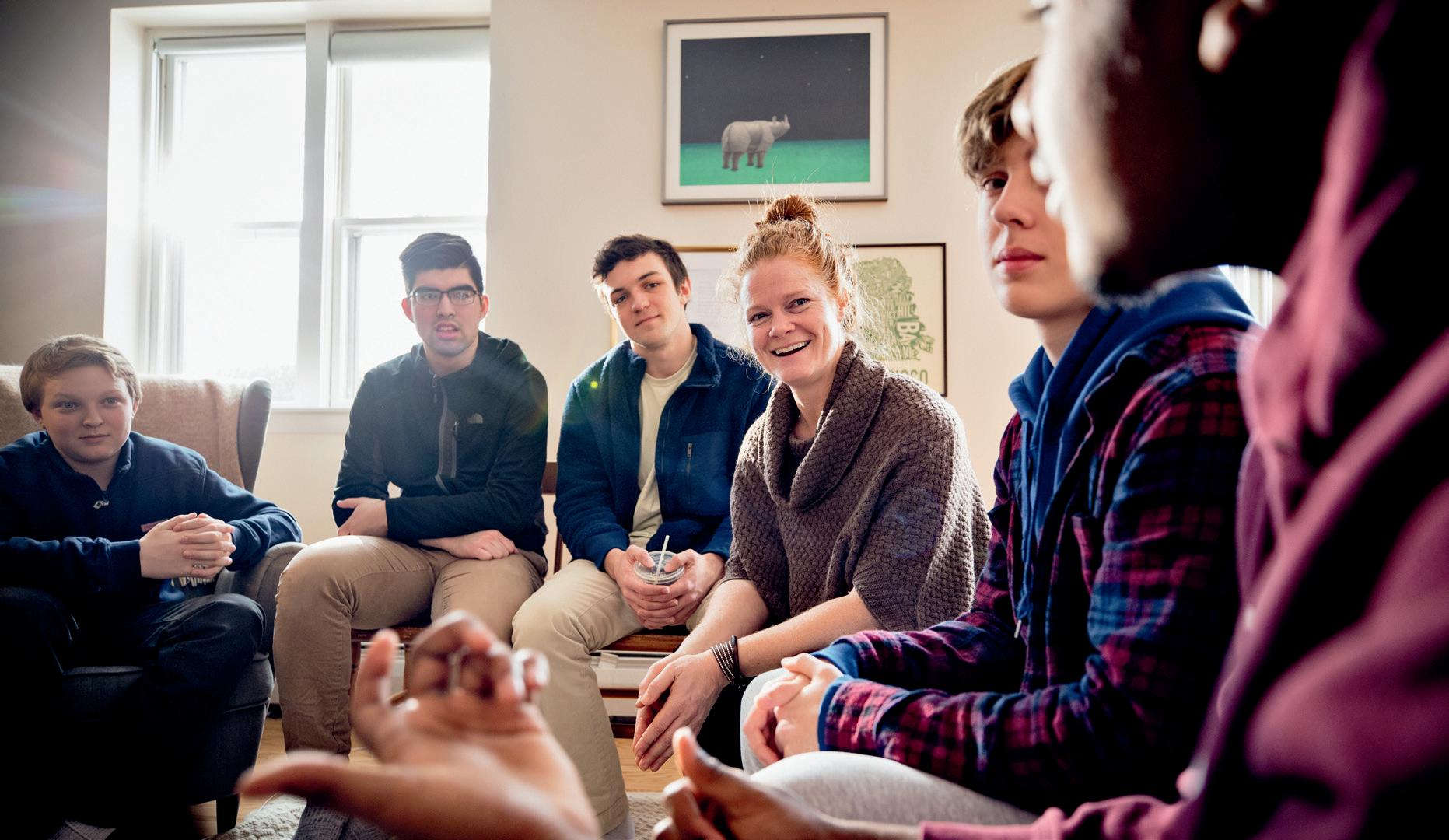
In regular advisee meetings, a small group (about 10) of advisees meets with their adviser and talk about . . . whatever feels important to talk about. When you do that for four years, you become a living, growing community. Sara: “A lot of our advisee meetings were just catching up on life. My adviser brought donuts, and we’d talk about where we were, academically and socially and emotionally.”
Some friends are like mentors; some are like siblings; some will be friends for life. You’re together through the easy stuff, the hard stuff, the strange stuff, the simple daily stuff. Day students — who spend long days on campus — feel it too. Emilio: “Living together is a collective experience. It’s like being on a ship, moving toward something on the horizon.”
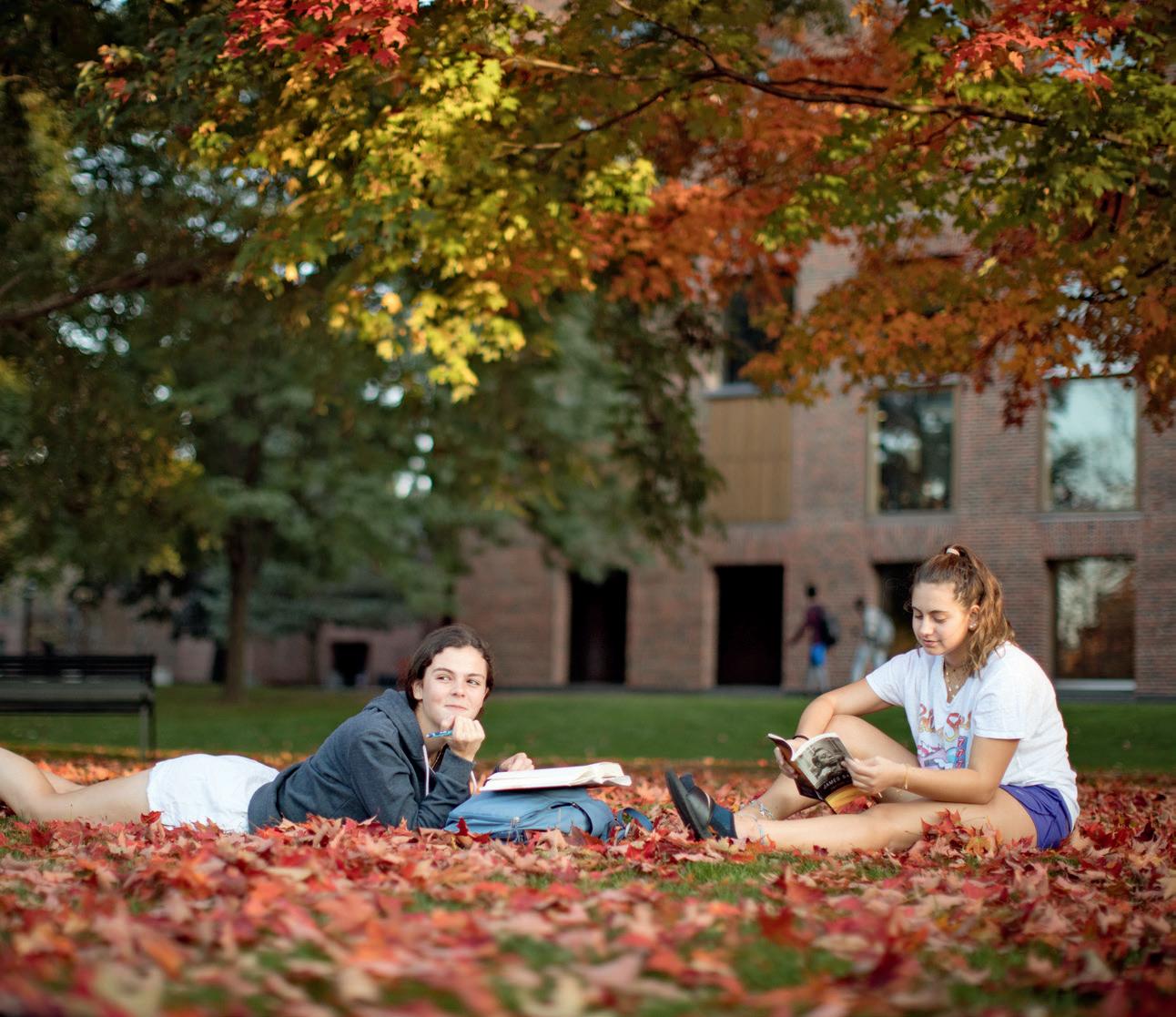
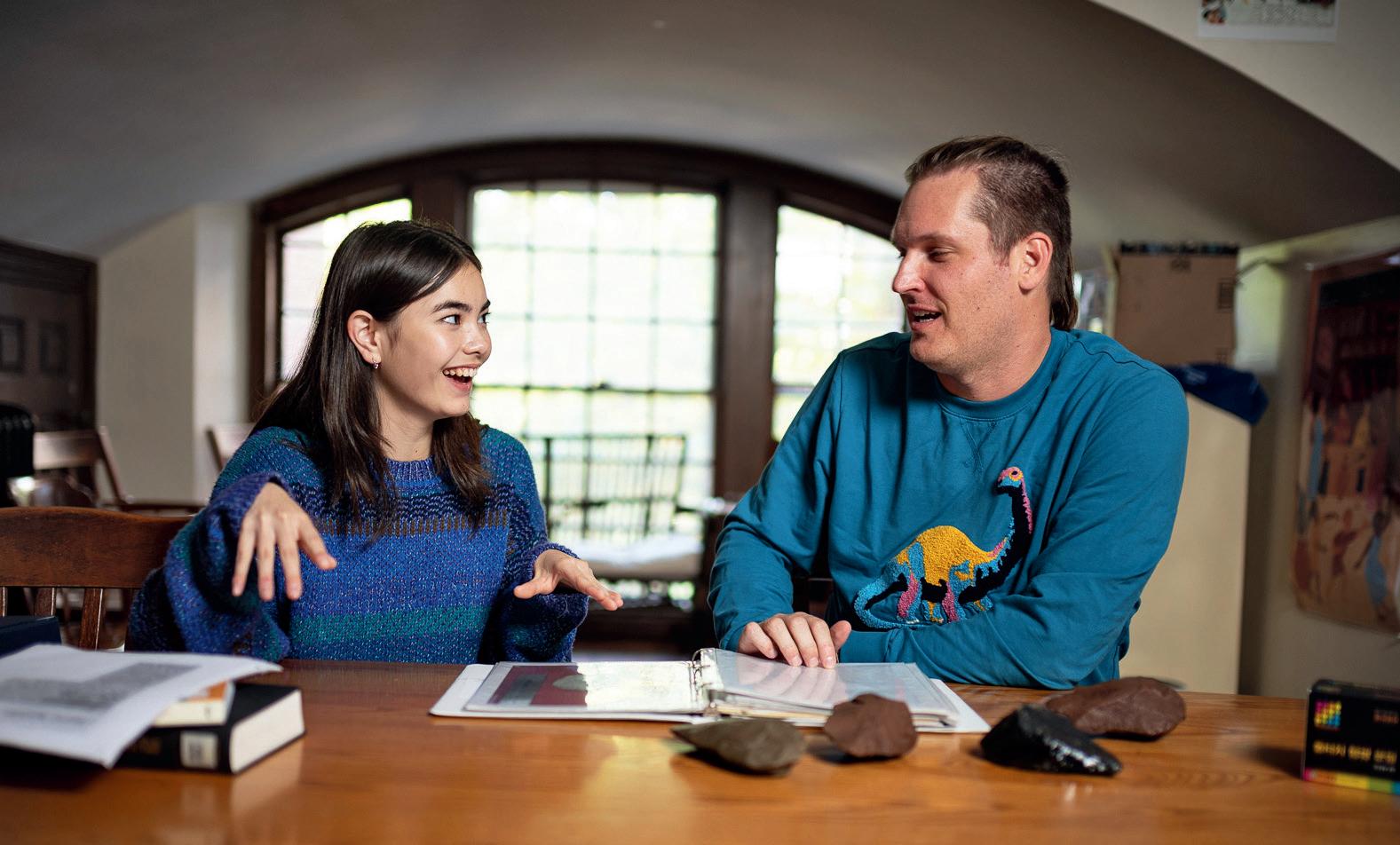
JD: “I remember this moment at the end of my second year, staying up late with three or four guys in my dorm, talking about a lot of different things: health care, the effects of social media, life behind the scenes at Disney. Through that conversation, I discovered a passion for philosophy. That’s very Exeter to me: spontaneous, unexpected, and kind of lifechanging.”
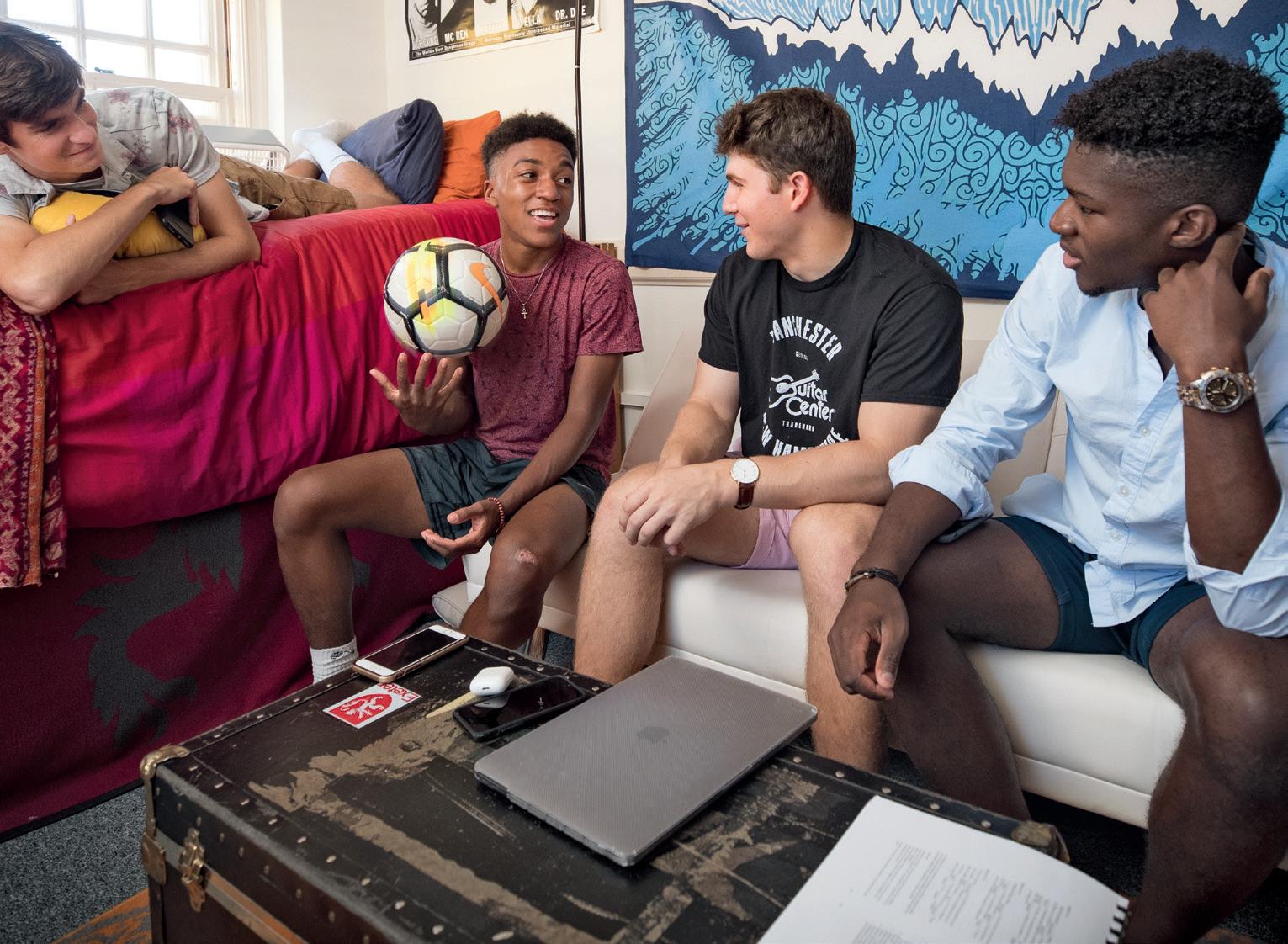
Carson: “Exeter is a place where people invite you to ask for help, to talk in class, to keep at it. Over time, you start to move into leadership positions — in the dorm, on a team, at the Harkness table. And — because you’re willing to ask for help, because you’ve persevered — you’ve gained a different kind of confidence. You can advocate for yourself. That process gives you the tools to succeed.”
Empowering spaces for students who share similar histories, cultures or identities. A few examples: Asian Advisory Board, International Student Alliance, Gender and Sexuality Alliance, La Alianza Latina, Muslim Student Association, and the Afro-Latinx Exonian Society (which recently celebrated its 55th anniversary!). Renee: “I’ve formed some of my best friendships in Transitions, a club for women of color. I ended up being the president, a role I never thought I’d be in. We meet once a week to talk about our days, or discuss specific topics, or have spa nights or movie nights. To me, it’s really about mentorship and support and just having fun together.”
“Not for self.” It’s one of our mottos. We believe that education should advance the public good. Exonians tend to feel that they could possibly change the world. That’s what happens when you’re surrounded by people who are ambitious and big-hearted and smart in all kinds of ways. Rachael: “I get motivated by other people’s stories. When I talk to my friends about where they came from, or about what’s happening in the world, it makes me realize that you don’t have to be old or rich or experienced to make change happen. We can do good work right now. Which is also that non sibi spirit.”
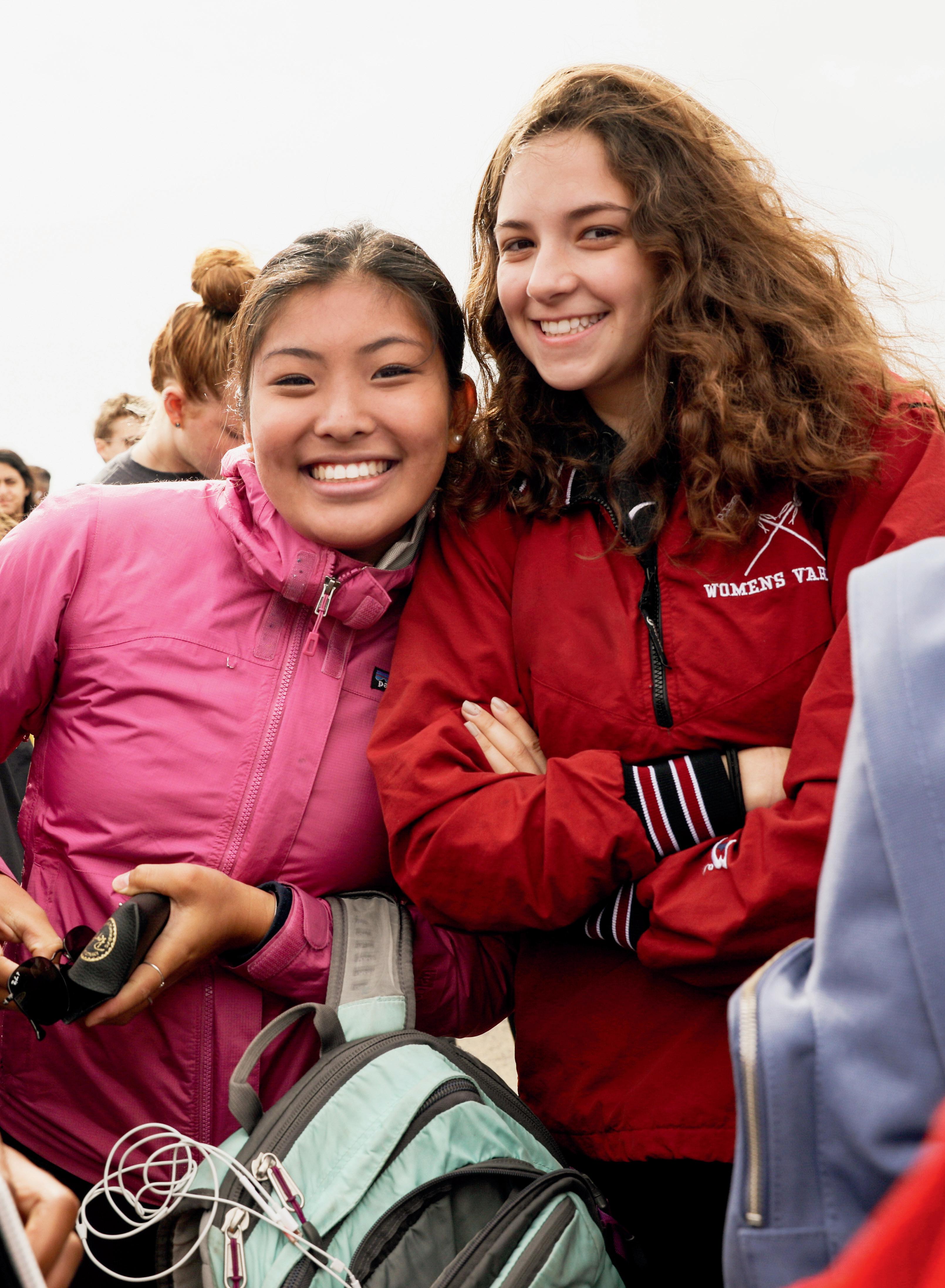
The Exeter Student Service Organization. It’s the largest student group on campus, with more than 700 members, dozens of partnerships with local organizations and hundreds of service opportunities every year. Emilio: “I’m the head of Middle School Mentors. Every week we go to a local middle school and help students with homework and share snacks. It means a lot for everyone involved. Exeter doesn’t require service — it’s just ingrained in the student body.”
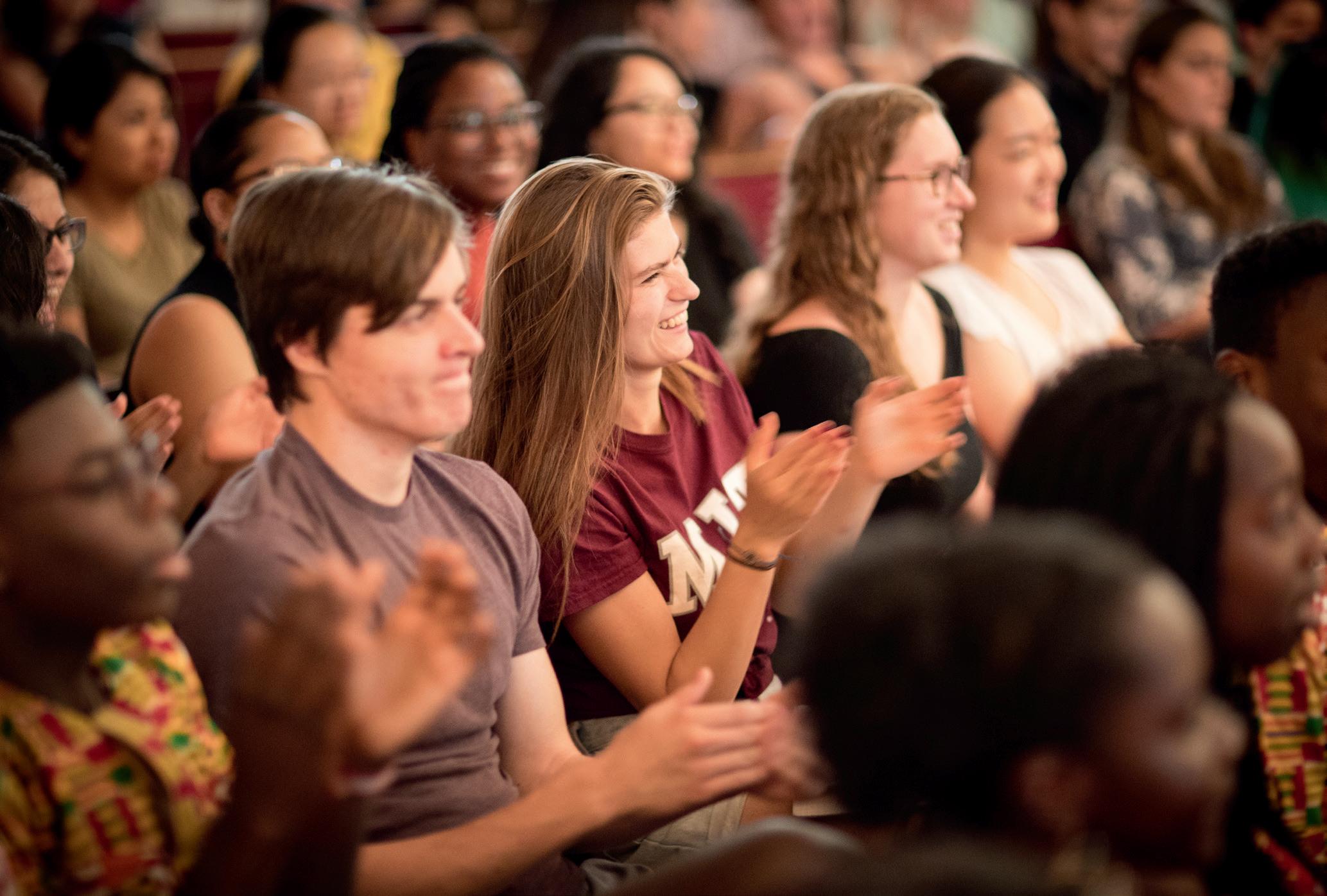
Twice a week, we come together as a community in the historic Assembly Hall. Often those all-school meetings include talks — by students, by alumni and by leaders in a range of fields. They’re moments of profound reflection and lasting value. Rachael: “I was so inspired by a talk given by an alum who works at Samsung. He had been on financial aid, and he talked about how that made him decide he’d give back to the school. That really resonated with my own values. I actually told him how I felt, and we’re now in touch by email.”
This annual tradition for seniors involves deep reflection, intensive revision and creative courage. Cesar: “In winter of senior year, if you’re taking English, your teacher will ask you to write a meditation about a personal experience. If you want to go a step further, you can submit it to the English Department for review. They pick a dozen or so to be delivered in spring in Phillips Church. I read mine. It was about coming out as undocumented. My mom had always told me: ‘Don’t tell anyone. It could end up hurting us.’ But I didn’t want to leave Exeter without talking about it.”
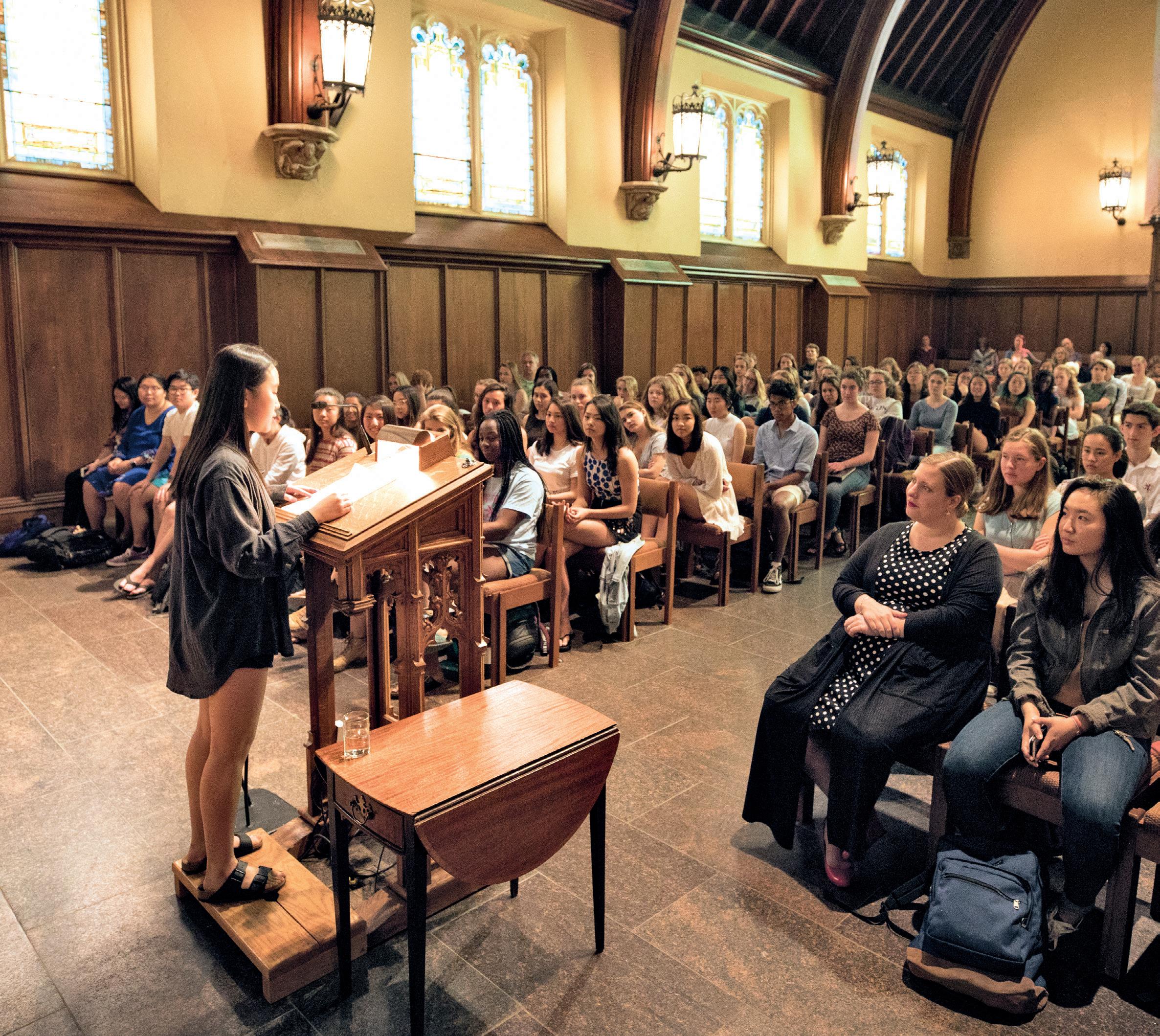
The days in fall and spring when every Exeter team plays Andover, our sibling school. (Exeter and Andover were founded by members of the Phillips family, in 1781 and 1778, respectively.) Faces are painted, bonfires are lit, mayhem ensues. Jake: “I’ve been playing sports since I was 3. I’d never played in front of any crowd close to the E/A crowd. Every seat was filled. The noise was almost deafening. It felt bigger than high school.”
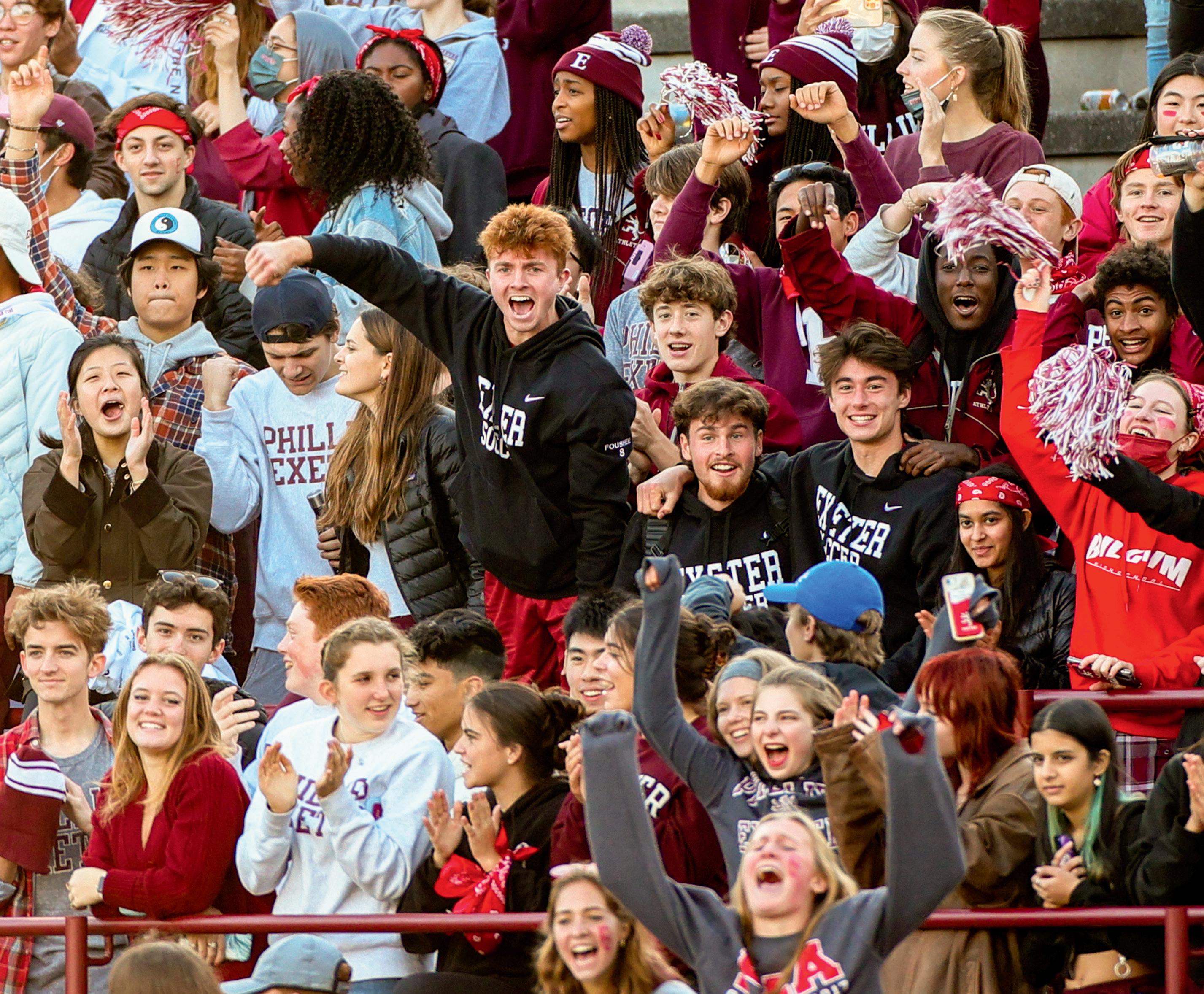
We have more than a dozen student dance groups, about 25 musical performance ensembles and hundreds of opportunities to work on theater productions, including joining Dramat, the student-run theater company. Lydia: “I’m involved in an a cappella group on campus, the Fermatas. When there’s a showcase, the whole atmosphere is so fun and energetic. Each group has a dress code, the crowd is cheering, the talent is phenomenal.”
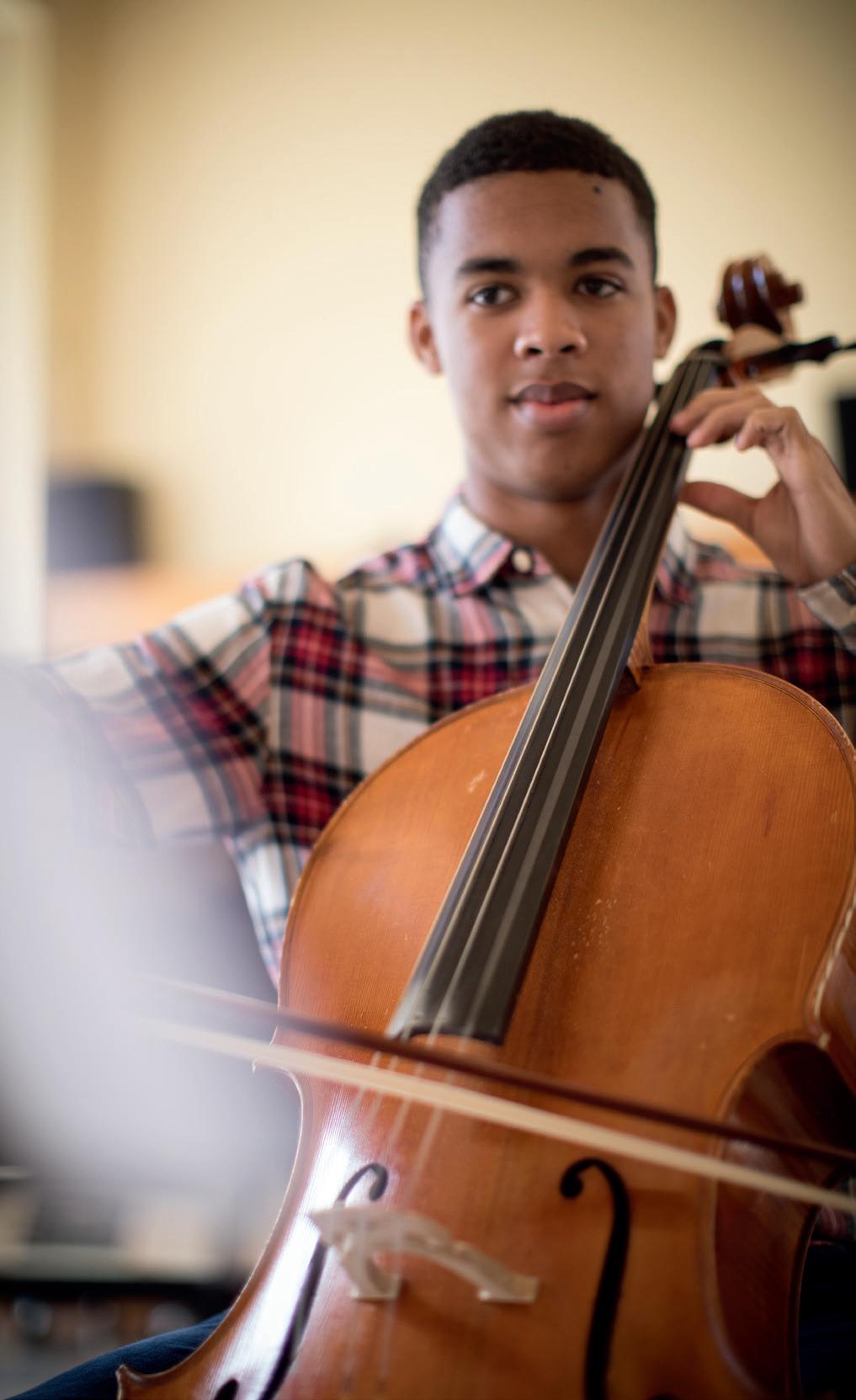
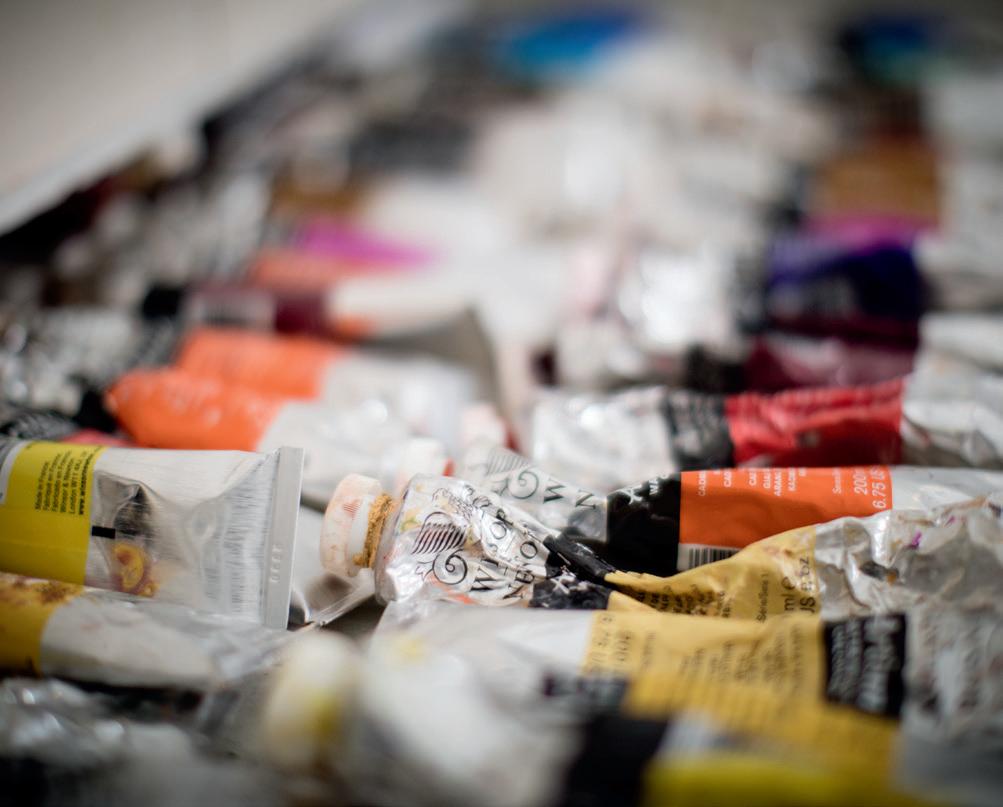
Being passionate about everything you do
Mr. Weatherspoon: “The students here have a strong sense of agency. That translates into passion. I see it in athletics, where teams are so supportive of each other, where they play with great regard for one another and for their opponents. And I see it in the arts. I remember going to my first concert here, a performance by the choir and the orchestra. I thought: ‘I know this isn’t a conservatory — so how are these students producing music of such a high quality?’”
Ingrid: “You have the ability to try anything you want to, without worrying that you’re not good enough. There are JV athletic teams or club sports. You can join any club, try new classes. I wasn’t the best singer on campus, but I took voice lessons and improved massively.”
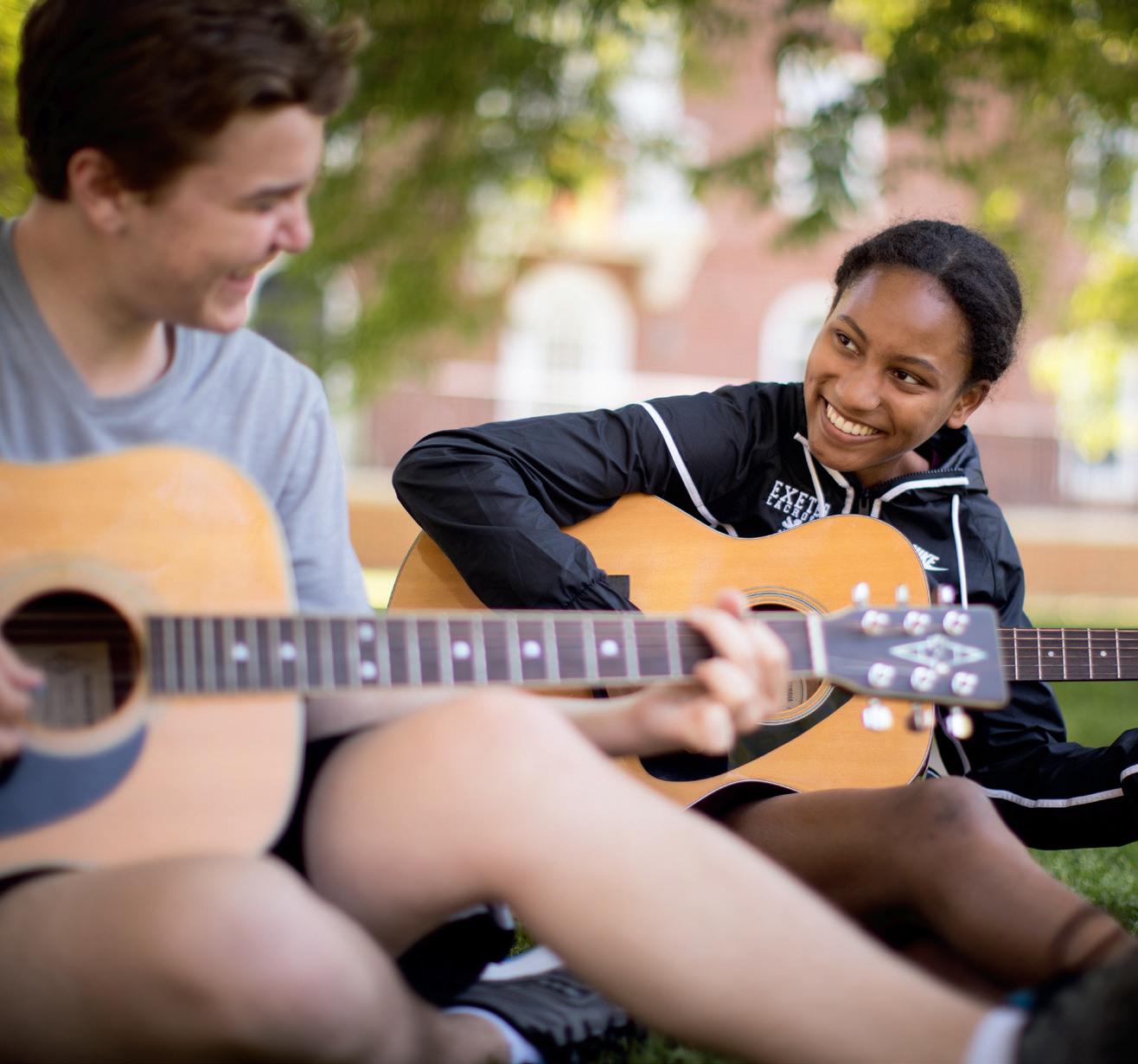
The spirit of exploration
Tommy: “I play hockey — that’s one of my biggest passions. But there’s a spirit here of exploring and experimenting. So I started co-hosting a radio show with my best friend. It’s called Absolute Bangeronis! (There has to be an exclamation point.) The show is kind of a mess, but a fun mess. You learn that you don’t have to sacrifice one passion for another.”
into
The boys’ volleyball team is a lowkey, high-achieving program. They’ve won five straight New England Championships, but they feel like a family.
Emilio: “The vibe is so supportive. If you mess up, it’s OK, you keep going, everyone’s there to pick you up. I’d actually never played before I got here. Now I’m starting. The school really values that kind of process — joining a new team or a new project and growing into it.”
Seeing school as a journey
Petra: “In middle school if I got a B, it was like the end of the world. At Exeter
I’ve gotten plenty of grades worse than a B. But I feel totally differently about it. Classes are so small, and teachers want you to talk to them and help you succeed. So I’m able to say: ‘I got a low grade. I’ll talk to my teacher and figure it out. This is one step in a bigger journey.’”
Getting excited about what your friends are doing
The great thing about being surrounded by fascinating people is that they’re doing fascinating things. You don’t have to do them too — but you’ll be inspired.
Lydia: “You learn from everybody you meet. My first-year roommate was really into musical theater, so she could share that experience with me. I was really into K-pop, and I shared stories about my family in Ghana. When people are excited about something, you get excited too.”
Our Global Initiatives Office offers 17 curricular programs on five continents, plus dozens of short-term programs across the country and around the world. Melanie: “I lived with a host family in Grenoble, France, for a term. I took classes in French literature, language and art. We went on field trips, learned from museums, traveled to Geneva and Paris and Aix-en-Provence. I learned a lot about myself that I never would have known if I’d stayed in America. And then I came back and convinced my friends to do it.”
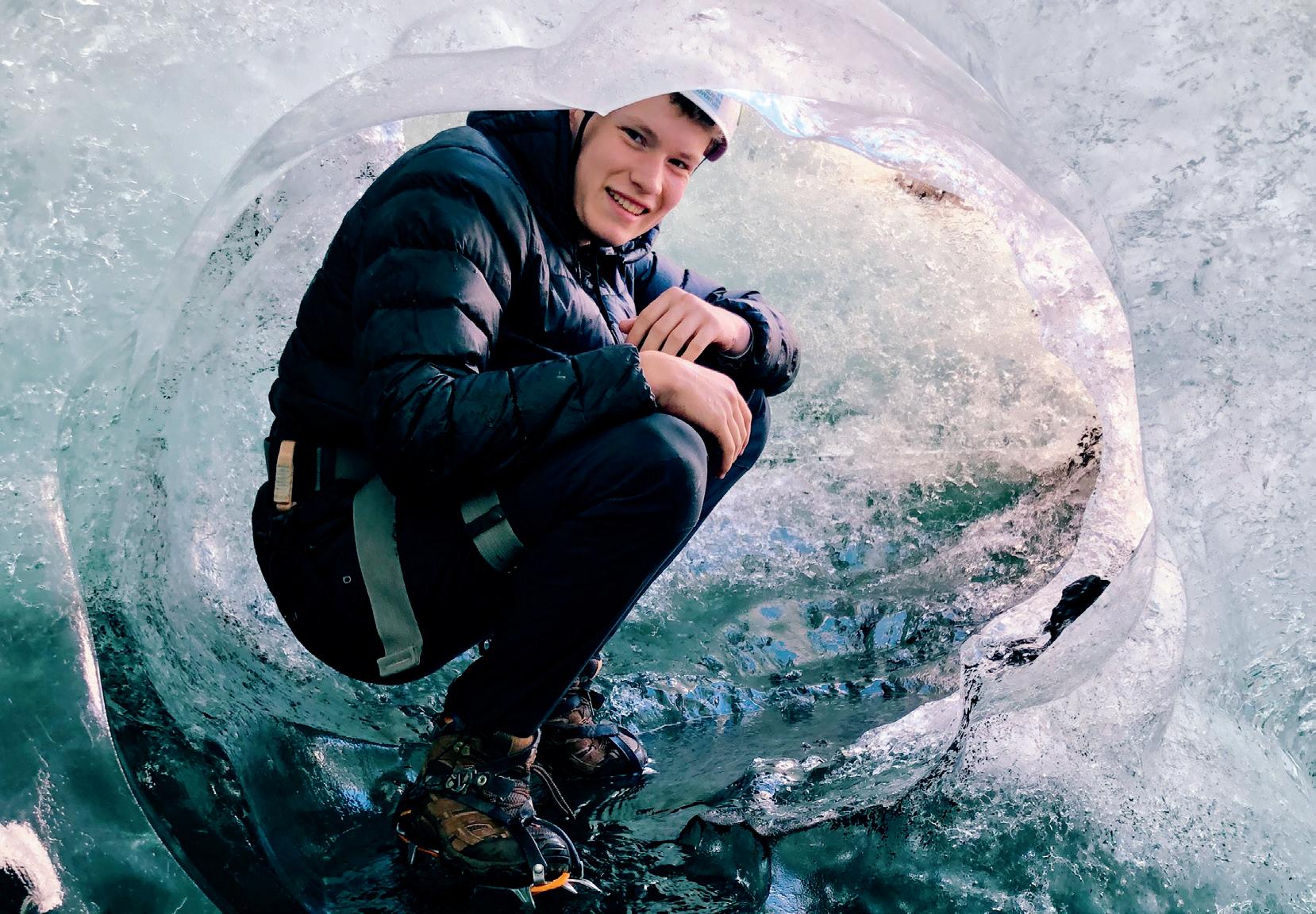
Ingrid: “I went to Rome for two weeks on a Global Initiatives trip organized by the Classics Department. It was the single wildest experience of my life. We spent every day walking around Rome — five faculty and 16 students — seeing every museum and historical site, playing ridiculous games, eating great food. By the end, the whole group was so close. And now that I’m in college, I have all this firsthand knowledge that surprises my professors.” www.exeter.edu
The ever-expanding number of clubs
Technically we have 150, but it’s hard to keep track because they keep forming. Kaylee: “I’ve been doing soccer and track my whole life, but since I came to Exeter I’ve joined Transitions, Christian Fellowship, Haiti Pen Pals and the AfroLatinx Exonian Society. People here are busy like that. It’s a great way to find a new community.”
Aiden: “The South Side Quad is right outside my dorm. In the springtime, kids will be playing spikeball or doing homework on the lawn. I love that. You get this big sense of community.”
Trying something new
Michael: “I’ve been really liking Model UN. I’d only heard of it right before I came to Exeter. It’s all about role-playing as a country, based in real-world facts. You’re trying to find what’s in the best interest of your country — and the global community. I’ve played China and Russia. Everyone is thinking and talking on the spot. No one is expected to be perfect.”
Academy Life Day
A school day when there are no classes, and everyone gathers by dorm and celebrates the joy of being a community. Tommy: “Dorms will do events like dodgeball or a cookout or a trip to Hampton or Rye beach. You get such a strong sense of togetherness.”
It’s not everything. But it’s pretty great.
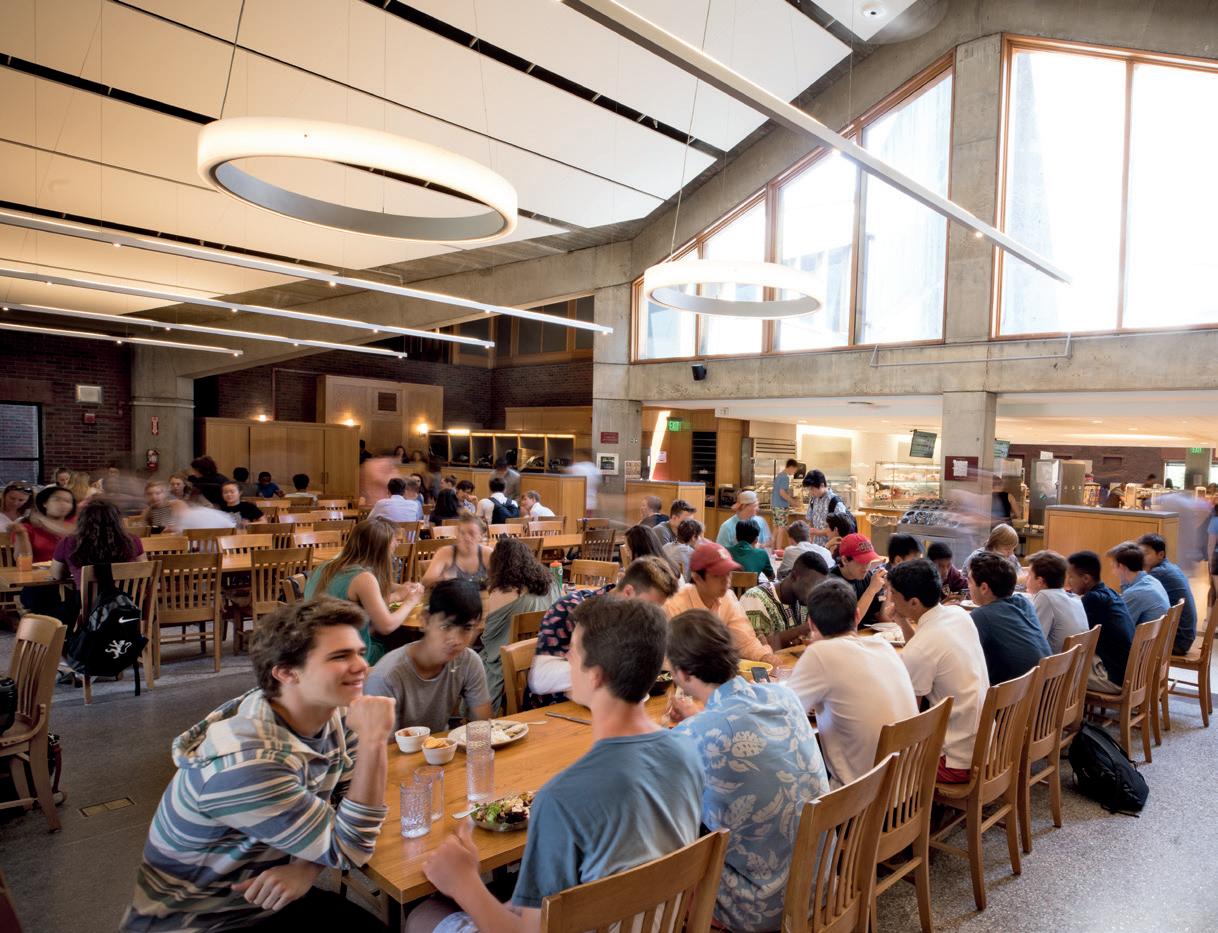
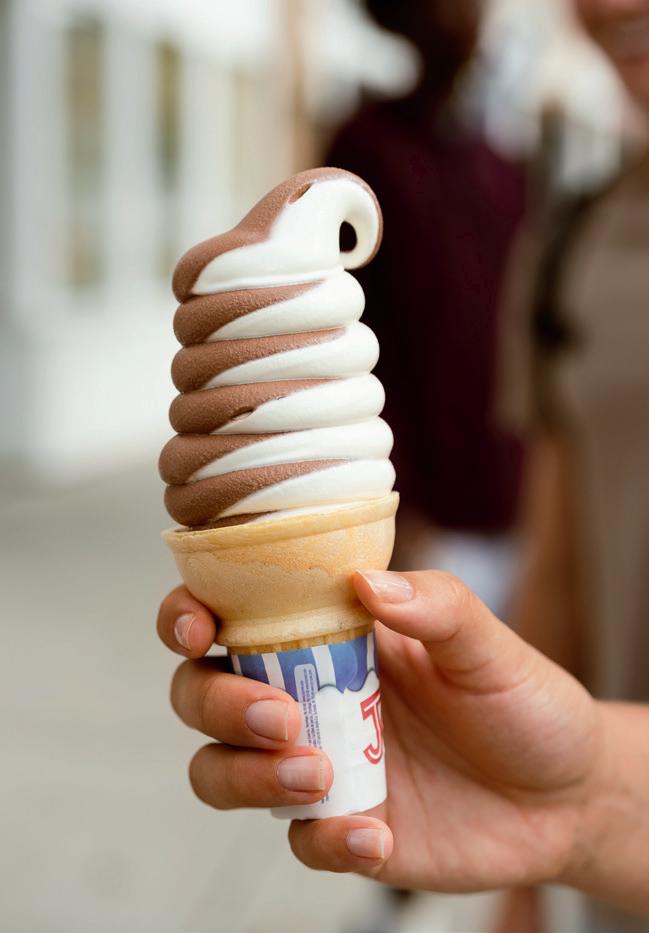
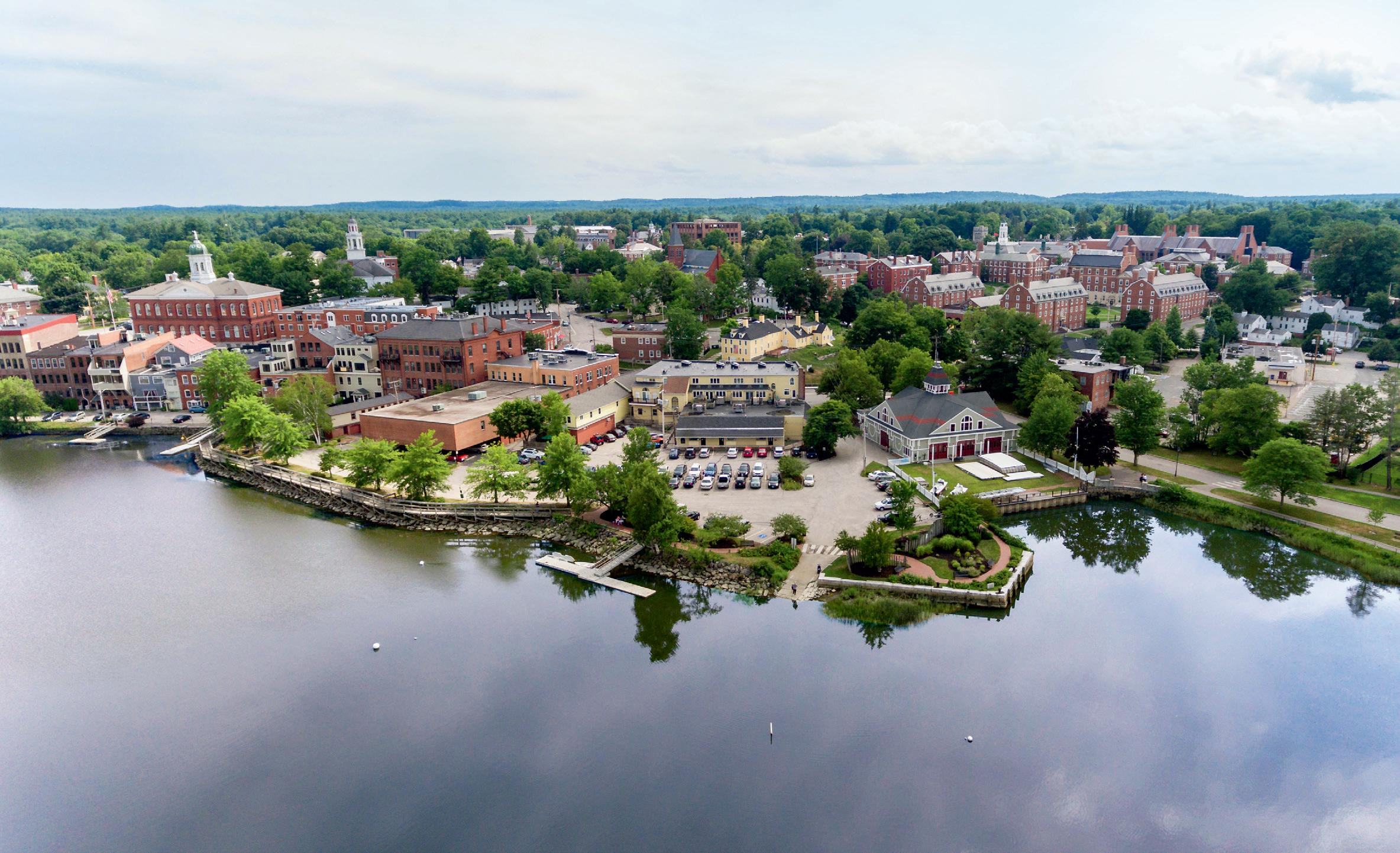
Exeter, New Hampshire, is close to the Atlantic coast, an hour from Boston, and charming on its own. Our campus is an extension of the downtown — a few sweet streets of independent shops and cafés and restaurants. Mr. Baseden: “It feels like a college town for a high school. Public streets crisscross the campus. A river runs through town. There’s a forest on one edge of campus and a train station and shops on another. Real life is happening right here. That’s a great setting for education.”
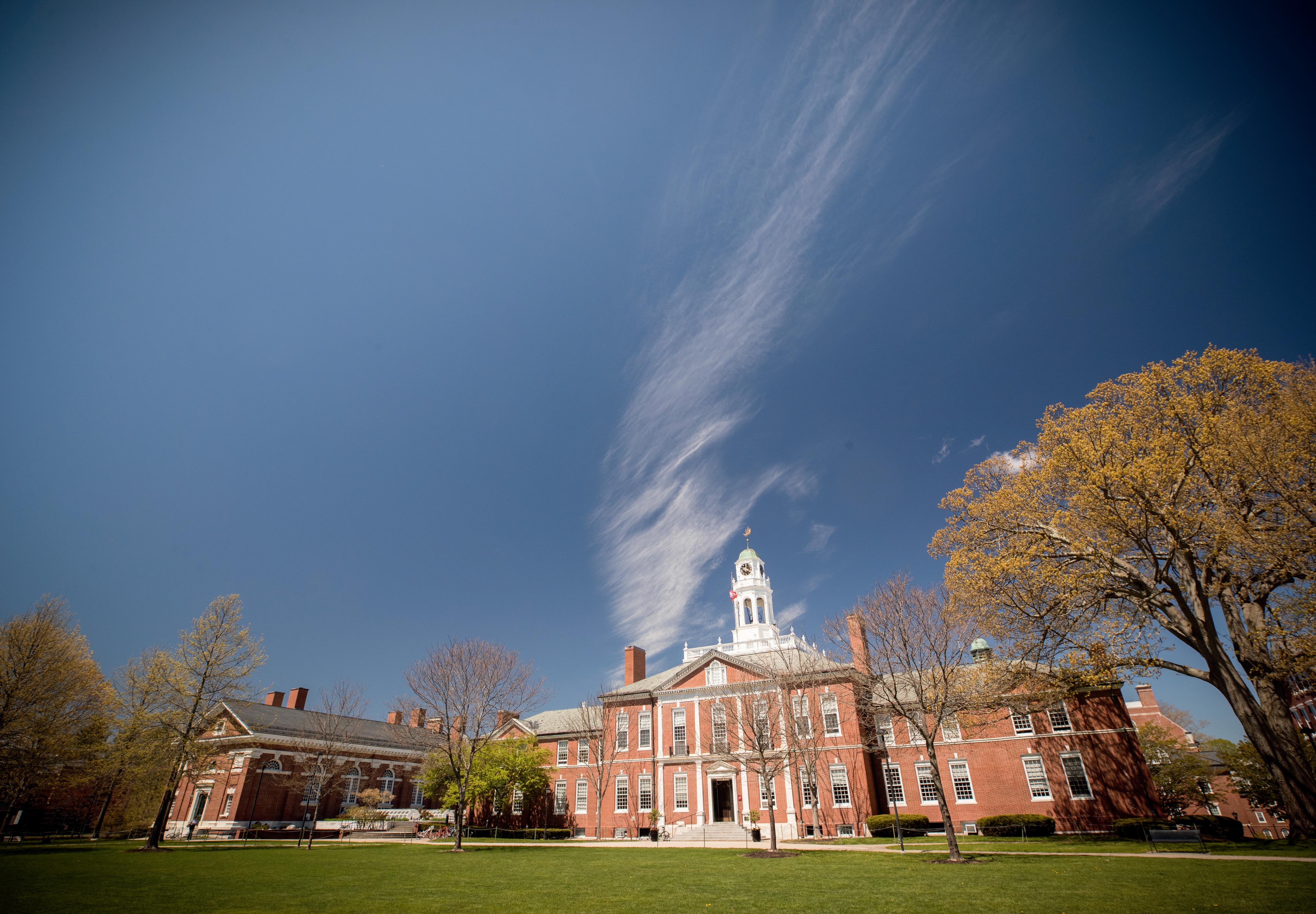
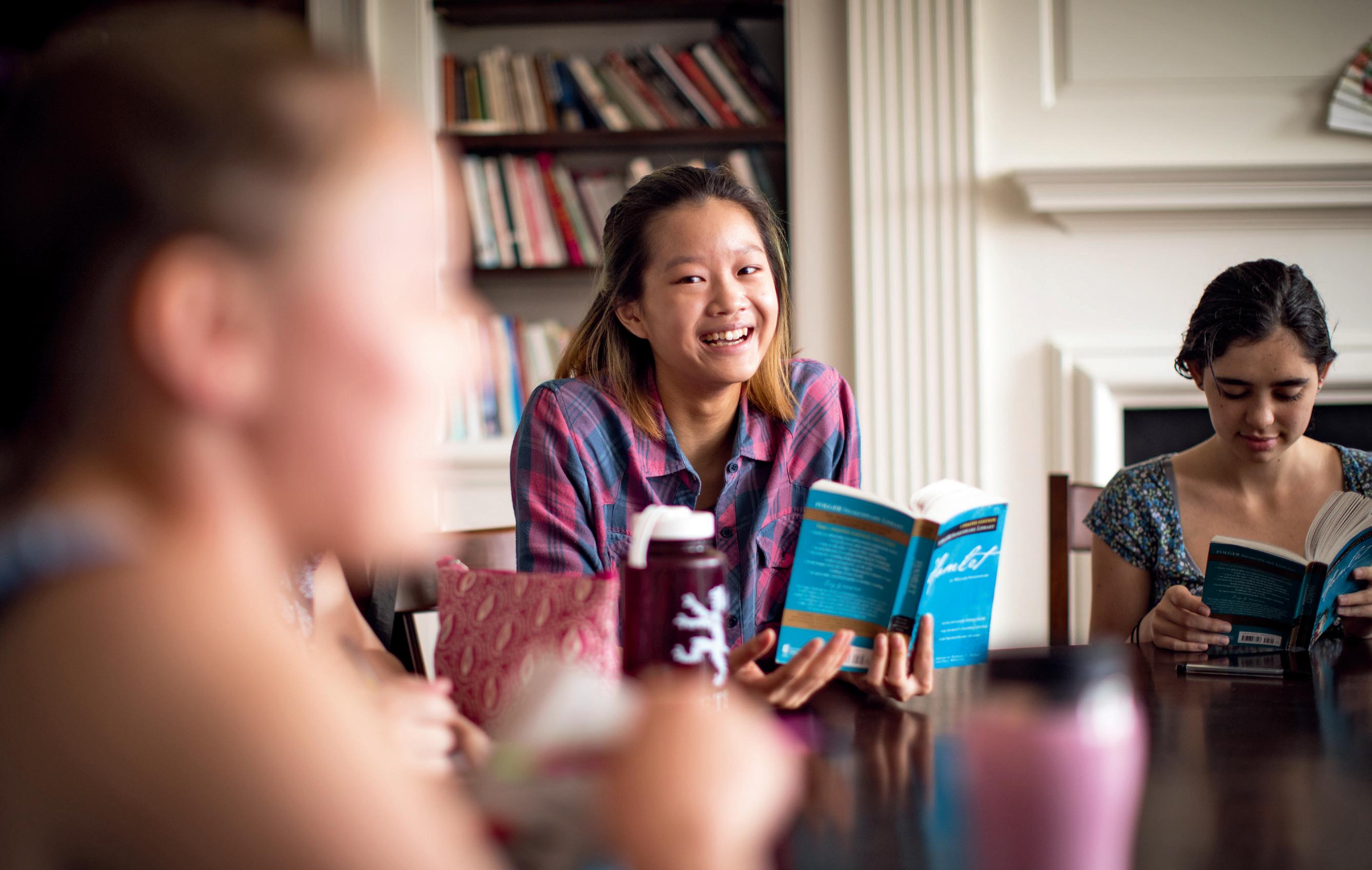
Literally just a sample of courses that start with “A” (out of 450 total courses, in 18 departments)
A Global History of Witchcraft
A Study of Human Sexuality
A Study of Sport in Society
Absolutism and Revolution, 1660–1800
Accelerated Arabic for Seniors
Accelerated Chemistry
Accelerated Chinese
Acting Advanced Astronomy Methods
Advanced Photography: Beyond the Camera
Advanced Projects in 3D Design
Advanced Readings in Russian
African Drumming and World Percussion
American Politics and Public Policy
Animal Behavior
Art of Protest
Asian American History and Literature
A few recent Global Initiatives programs
Cedar Mesa, UT
Delhi, India
Gottingen, Germany
Grenoble, France
Havana, Cuba
Hong Kong
Iceland
Lazio, Italy
Madrid, Spain
Martinique
Maui, HI
Monteverde, Costa Rica
Montgomery, AL
New Orleans, LA
Rome, Italy
San Antonio, TX
Tokyo, Japan
Woods Hole, MA
Yellowstone, MT
Academic facilities
Phelps Science Center
• State-of-the-art facility for research and teaching.
• 22 classroom-labs with Harkness tables.
• Four common labs for interdisciplinary and independent student work.
• 900-gallon tropical marine aquarium.
• Biology wet table.
• Teaching garden with plant species native to New England.
• Design Lab with equipment, space and supervision to experiment in mediums from robotics to woodworking.
Grainger Observatory
• On-campus facility, with three domed observatories and a heated classroom building and library.
• Home to a 0.70m PlaneWave CDK-700 Corrected Dall-Kirkham telescope, controlled on-site or remotely via internet access.
• Instruments include reflecting, refracting and catadioptric telescopes, CCD imagers, photometers, spectrographs and a heliostat.
• Lighting for daytime and nighttime operations.
• Automated weather station.
Phillips Hall
• The first building designed (in 1932) specifically for Harkness classrooms at Exeter.
• Includes fully wired, media-equipped classrooms for English and modern languages.
• A recent renovation included energyefficient mechanical and lighting systems, and the installation of a large geothermal well for cooling and heating.
Academy Building
• Home to much-loved Assembly Hall, where the whole school gathers twice weekly for speakers, performances and celebrations.
• Includes classrooms for mathematics, history, religion, classical languages, anthropology, psychology and philosophy.
• Climbing up to the historic Academy Building’s bell tower is a senior class tradition.
Academy Library
• Award-winning, landmark building designed by Louis Kahn.
• The largest secondary-school library in the world.
• More than 381,000 print and electronic volumes; extensive reference collection.
• Special collections include treasures dating to the 13th century.
• 201 individual study carrels, several reading lounges, ground-floor common area with certifiably cozy seating.
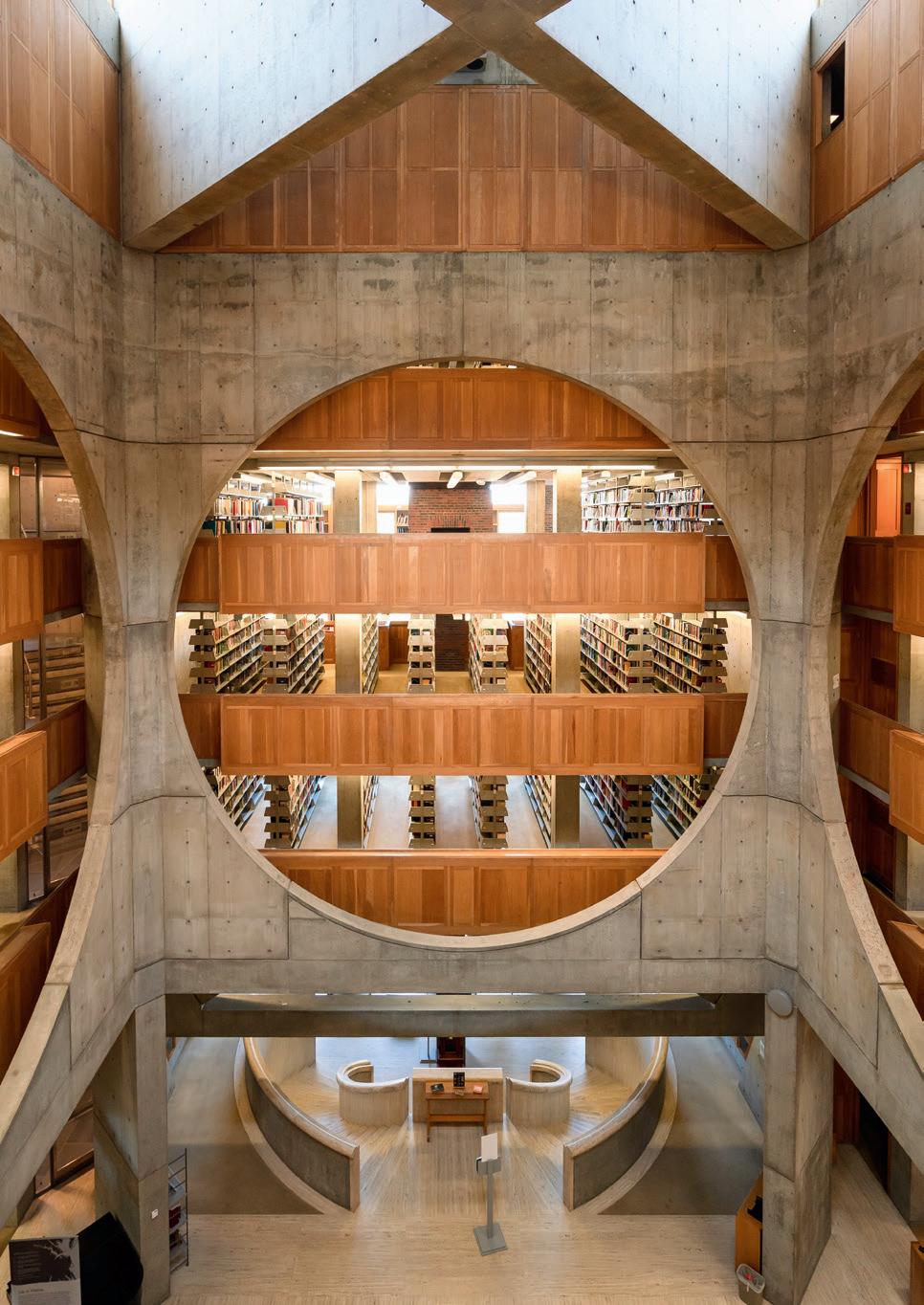
A mere sample of about 150 student clubs and organizations in various categories (except Arts, which is on the next page!), all of which offer leadership opportunities
Affinity, Identity, Culture, Spirituality
Afro-Latinx Exonian Society
Asian Advisory Board
Black Students of Excellence
Chinese Student Organization
Christian Fellowship
Exeter Jewish Community
Exeter Pinoy Society
Exonians with Disabilities or Different Abilities
Finis Origine Pendet (lowincome students)
Gender and Sexuality Alliance
Interfaith Conversation Club
International Student Alliance
Japanese American Society
La Alianza Latina
Middle Eastern Society
Multi-Racial Exonian Society
Muslim Student Association
Queer Kids of Color
Subcontinent Society
Thai Club
Vietnamese Club
Skills, Sports, Activities
Archery Club
Augmented Reality/Virtual
Reality Association
Badminton Club
Baking Club
Beekeeping Club
Chess Club
Equestrian Club
Exeter Canoe Club
Exeter Surf Club
Exeter Wood Shop
Hydroponics Club
Makers of Exeter
Outing Club
Photography Club
Ping Pong Club
Rock Climbing Club
Ski Club
Stand-Up Comedy
VERTEX Robotics Club
Academics
Astronomy Club
Biology Club
Chemistry Club
Chinese Language Society
Economics Club
Engineering Club
Geography Club
German Club
Girls in STEM
History Club
Kirtland Society (Latin Club)
Linguistics Society
Math Club
Philosophy Club
Psychology Club
Russian Club
Science Bowl
Science Olympiad
Activism, Engagement, Environment
Activism in Art
Animal Advocates Club
Council for Equity and Social
Justice
Divest Exeter
Energy Club
EXcycle (closed-loop recycling)
Exeter Climate Lobby
Exeter Political Union
Exeter Student Service
Organization
Feminist Union
Food Waste Reduction Club
Permaculture Club
Students Ending Slavery
Business, Government, Debate
Daniel Webster Debate Society
Exeter Business Club
Exeter Forensics Team
Exeter Investment Group
Mock Trial
Model UN
Social Innovative Thinking for Entrepreneurs
Student Council
TEDx Club
Young Female Entrepreneurs
Media, Communications
The Exeter Review
The Exonian (our newspaper since 1878!)
Liber (classics publication)
MATTER (science publication)
PEAN (yearbook)
Pendulum (art/literary)
Sustain Environmental
Magazine
WPEA, 90.5 FM
Community spaces
Elizabeth Phillips Community Center
• A kind of campus crossroads — where you run into old friends and meet new friends.
• Home to Grill, our own café, snack bar and (yes) grill.
• Home to the Student Activities Office, the Exeter Student Service Organization, WPEA and The Exonian newspaper.
Office of Multicultural Affairs
• A warm, welcoming space dedicated to creating an inclusive campus.
• The office’s staff and faculty serve as primary advisers for culture, affinity and identity groups.
• Collaborates with student and staff to produce major campus events, including Asian Night Market,
International Day, the Students of Caribbean Ancestry Carnival, LGBTQ+ Pride Month, Dia de Los Muertos, Black History Month and more.
Lamont Health and Wellness Center
• Recently renovated facility at the heart of campus.
• Health care and counseling services available daily by appointment or walk-in.
• Health care staff qualified to help with allergy management, nutritional counseling, immunizations, sports injuries and prevention, and sexuality and sexual health.
• Counseling staff qualified to help with a wide range of issues, including homesickness, healthy relationships, sleep and time management.
• Home to the Health and Human Development Department. Phillips Church
• Home to our Department of Religious and Spiritual Life, overseeing worship and programming in nearly a dozen faith traditions.
• Features a Christian sanctuary, a puja room for Hindu students, a Jewish ark and two Torah scrolls, a room for Buddhist meditation, and the Salah room for Muslim prayer.
• Registered nurses on duty day and night; physicians and counselors on call for emergencies 24/7.
• Vibrant, inviting meeting space includes two kitchens, one kosher.
• Musical performance space features professional theater lighting and control system, state-of-the-art recording facilities.
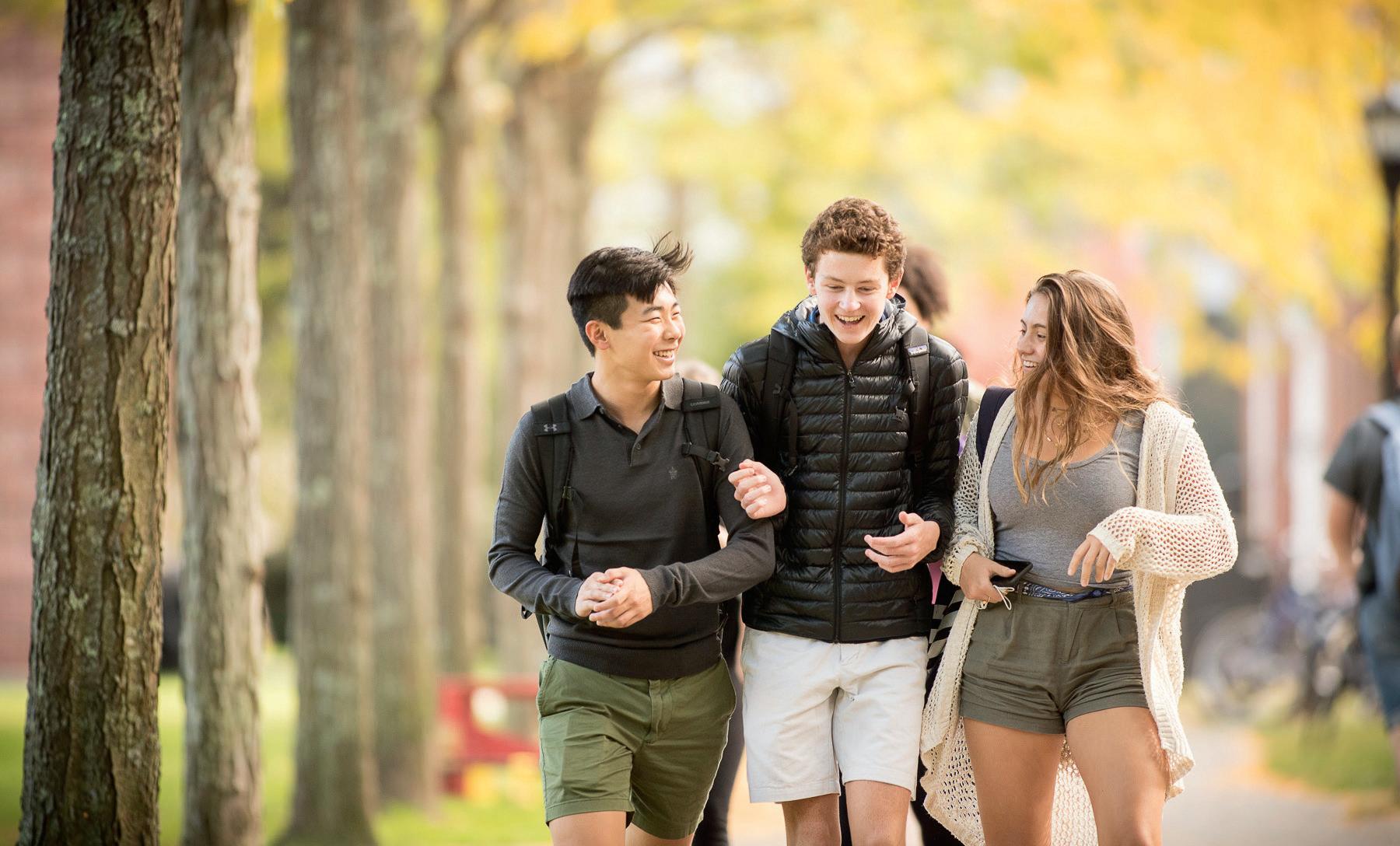
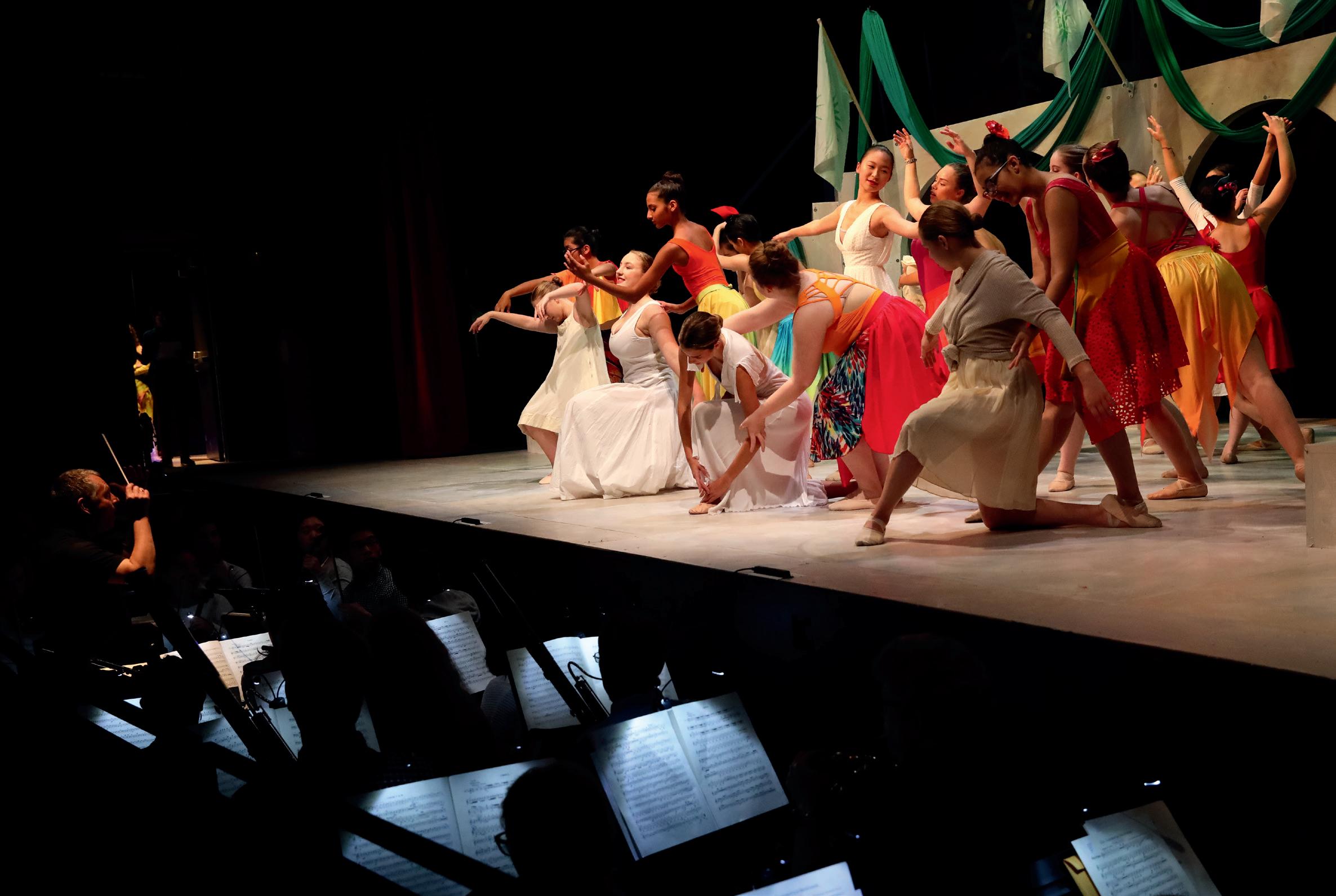
4 facts about the arts at Exeter
• 200+ student artworks in the endof-year exhibit
• 15+ dance clubs
• 25% of students collaborate on theater productions each year
• 50% of students take music lessons in one of more than 30 instruments, including bagpipes, djembe, euphonium, fiddle and sitar
A few student performing arts clubs
Academy Belly Dancing Society
Beat of Asia (Asian dance)
Caderas (Latino/Hispanic dance)
Democracy of Sound (experimental music)
Dimensions (contemporary dance)
DRAMAT (student-run theater)
Echappe (ballet)
Exeter Vocal Jazz Ensemble
Gli Scalatori (Italian madrigals)
Imani (coed hip-hop dance)
Lionettes (female jazz/commercial dance)
Outkast (male step team)
PRECISION (female step team)
Reel Life Productions
Shakti (Bollywood dance)
West African Dance and Expression
A few courses in the arts
3D Design: Tech + Form + Fashion
Advanced Ceramics: Molding Meaning
Becoming Musical
The Compositional Process
Dance Composition
Dance in Society
Filmmaking
Modern Music Making
Music Recording and Mixing
Printmaking: Pop Culture
Puppetry and Props
Screenwriting
Solo Performance and Stage Presence
A few music performance opportunities
6 a cappella ensembles
Chamber Orchestra
Concert Band
Concert Choir
Exeter Association of Rock
Exeter Choral Union
Global Rhythm Ensemble
Jazz Combos
PEA Jazz Ensemble
Symphony Orchestra
Symphonia
Voices of Praise (Gospel Choir)
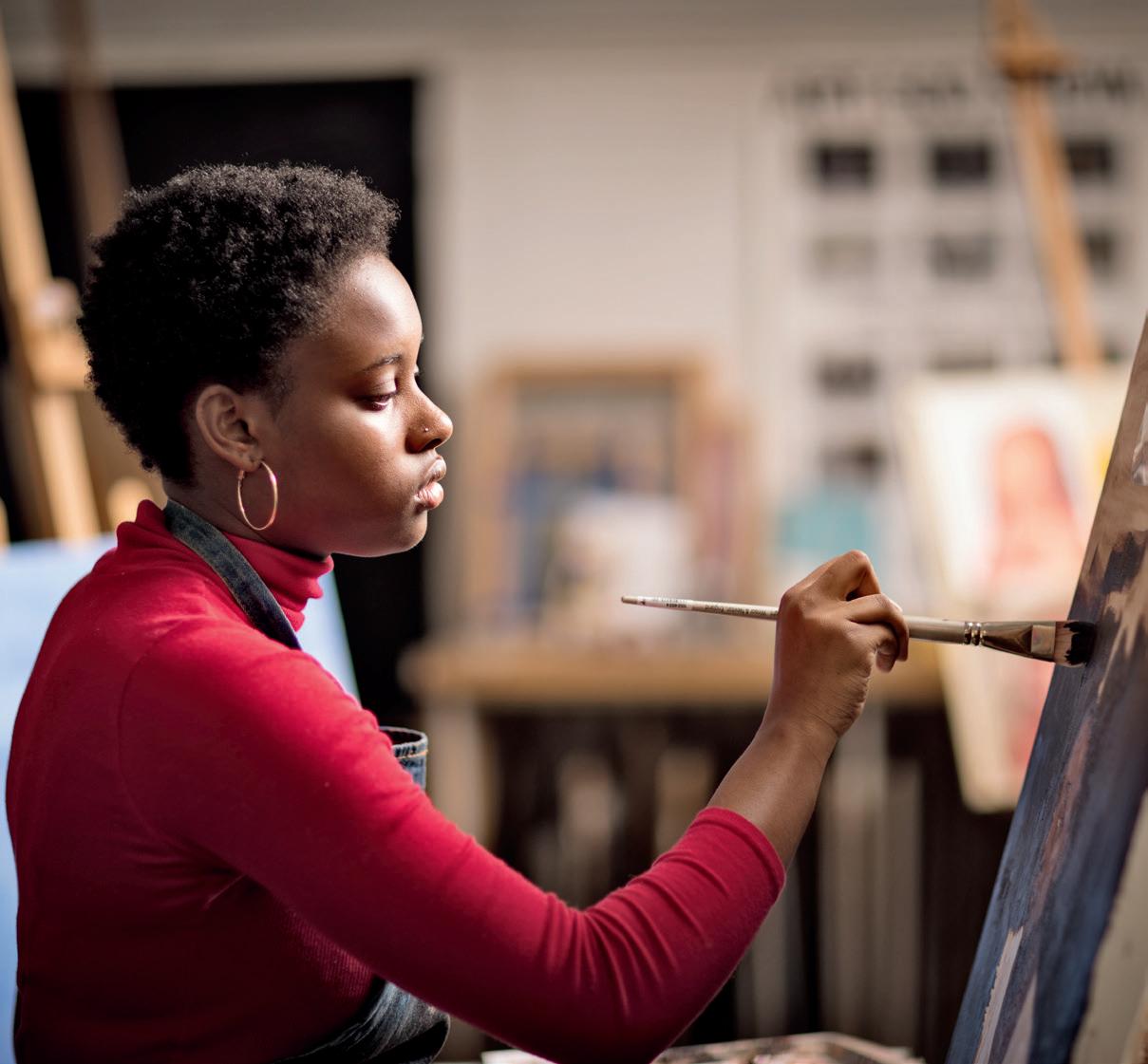
Arts facilities
Goel Center for Theater and Dance
• 63,000-square-foot state-of-the-art facility.
• Two theaters: 350-seat mainstage with orchestra pit, 149-seat thrust stage.
• Two dance studios: 119-seat performance studio, studio for classes and rehearsals.
• Scene shop, costume studio, technical galleries.
Mayer Art Center and Lamont Gallery
• Exhibition space displaying works by students and faculty and local, national and international artists.
• Professional, studio-style fine arts classrooms for painting, printmaking, photography and 3D design.
Forrestal-Bowld Music Center
• Large rehearsal rooms, study areas, performance and classroom spaces.
• Home to more than 40 pianos, of which 21 are Steinway grands, plus hundreds of instruments for students to browse through and borrow.
• State-of-the-art electronic music studio.
• Music, media and recording library.
• Spectacular new 250-seat performance space with livestream capability.
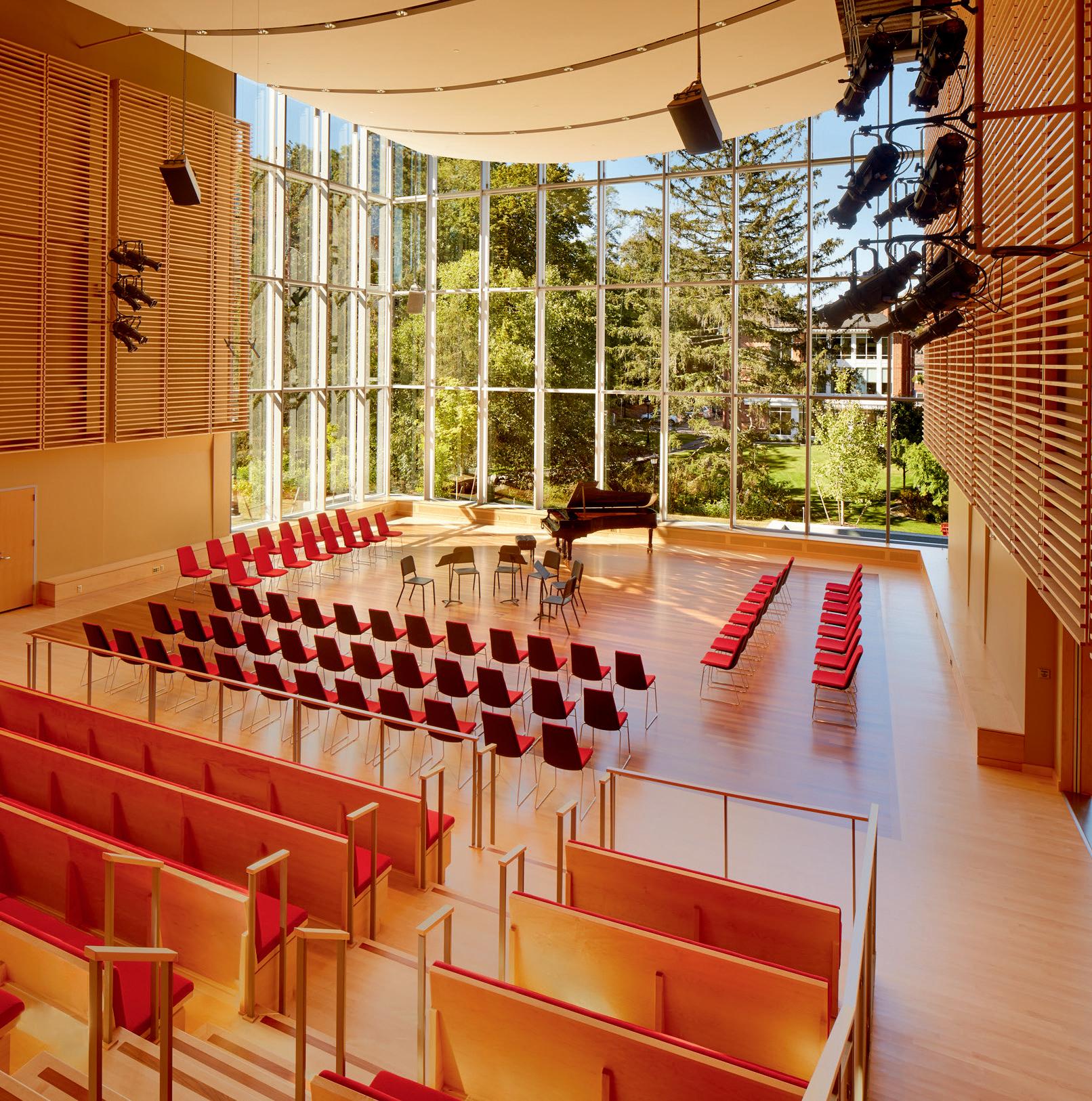
Athletic teams
Fall
Cross Country Boys (V, JV)
Cross Country Girls (V, JV)
Field Hockey (V, JV)
Football (V, JV)
Soccer Boys (V, JV)
Soccer Girls (V, JV)
Volleyball Girls (V, JV)
Water Polo Boys (V, JV)
Winter
Basketball Boys (V, JV)
Basketball Girls (V, JV)
Hockey Boys (V, JV)
Hockey Girls (V, JV)
Squash Boys (V, JV)
Squash Girls (V, JV)
Swimming and Diving Boys (V, JV)
Swimming and Diving Girls (V, JV)
Winter Track Boys (V, JV)
Winter Track Girls (V, JV)
Wrestling (V, JV)
Spring
Baseball (V, JV)
Crew Boys (V, JV)
Crew Girls (V, JV)
Cycling (V)
Golf (V)
Lacrosse Boys (V, JV)
Lacrosse Girls (V, JV)
Softball (V, JV)
Tennis Boys (A V, B V, JV)
Tennis Girls (A V, B V, JV)
Track Boys (V, JV)
Track Girls (V, JV)
Volleyball Boys (V)
Water Polo Girls (V, JV)
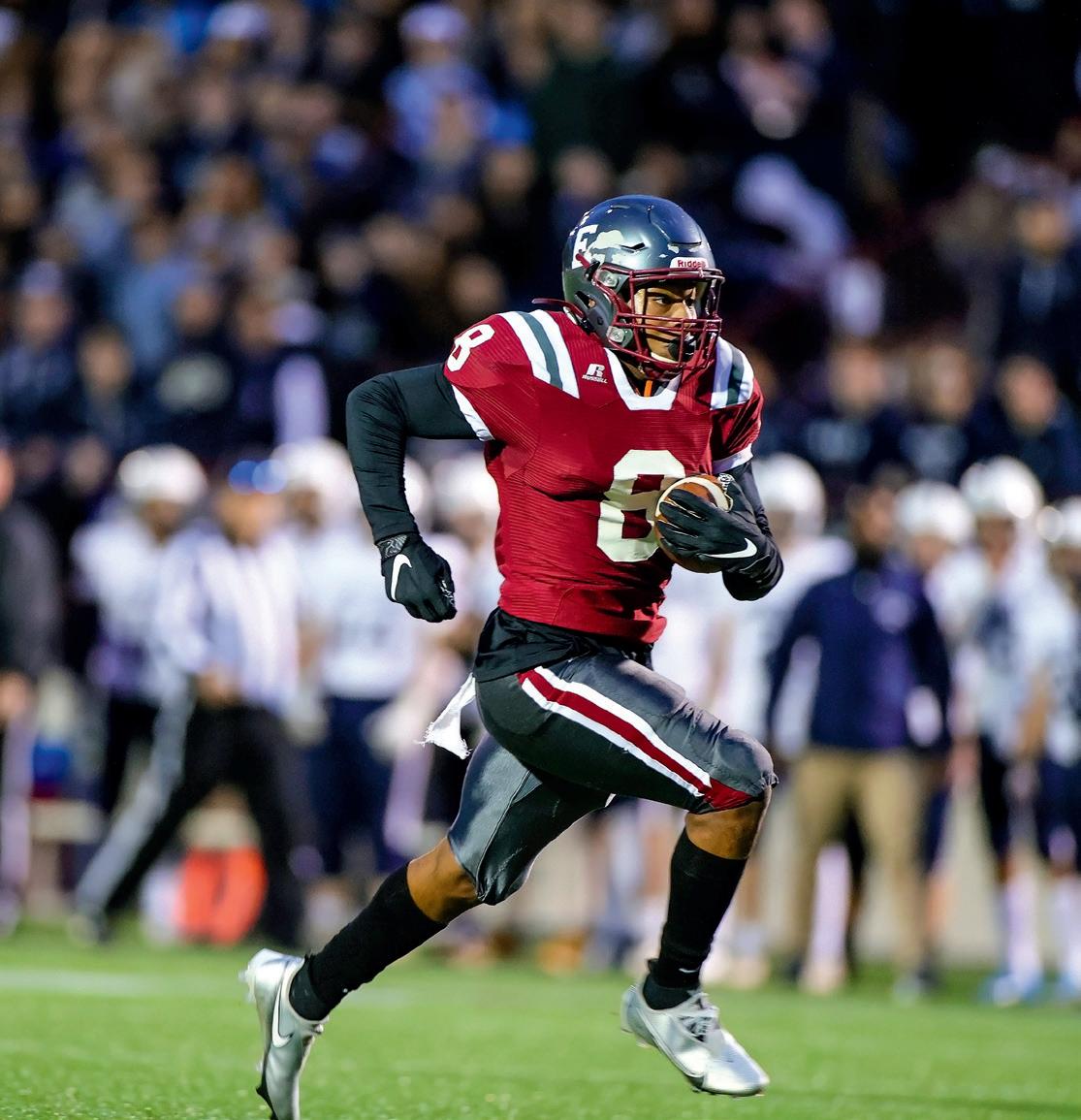
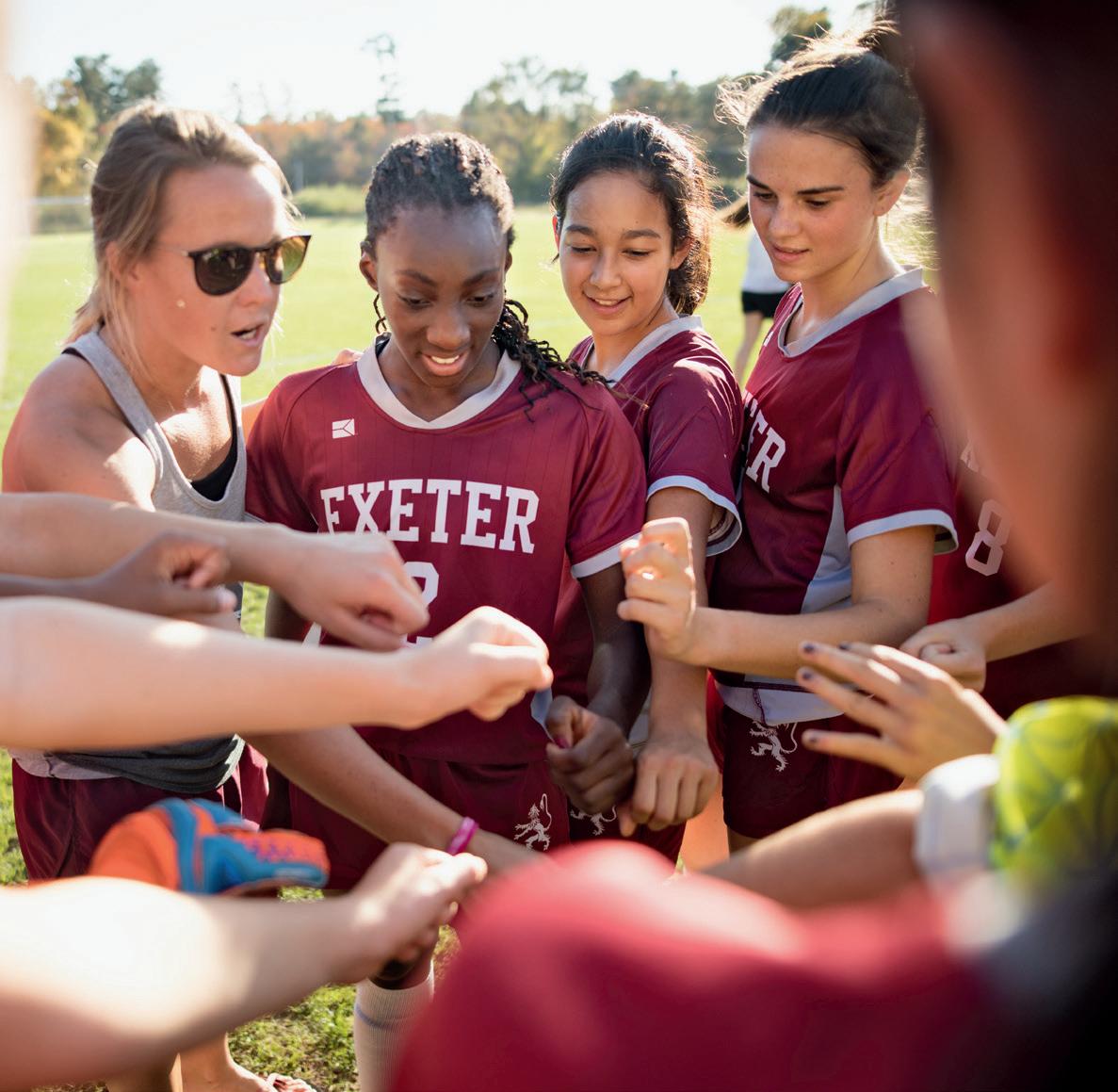
Athletic facilities
Downer Family Fitness Center
• 9,000-square-foot open-concept facility for sports performance training and free-time workouts.
• Turf space for agility training.
• 38 pieces of cardiovascular equipment.
• 12 power racks with Olympic platforms.
William Boyce Thompson Field House
• Year-round advanced training facility for track and field teams.
• Dedicated wrestling center.
• 200-meter track; NCAA-regulation areas for shot put, high jump, long jump, pole vault.
• Four tennis courts, multipurpose infield, batting cages.
• Livestream capabilities.
Ralph Lovshin Track
• All-weather outdoor track with livestream capability.
• Eight lanes, three long-jump pits, two vault runways.
• Full-apron high-jump venue, shot and discus throwing area and two javelin sectors.
• Seating for 480.
• 33 acres of playing fields.
• Four miles of running trails.
• 14 outdoor tennis courts, 3 with livestream capabilities.
• Baseball and softball diamonds with premier grass, pitching bullpens and livestream capabilities.
• Hatch Turf Field for field hockey, with livestream capability.
Phelps Stadium
• Home to football and lacrosse.
• Turf field, night-game lighting.
• Press box, two team rooms, athletic training facility.
• Livestream capabilities.
• Seating for 5,000.
• 10 international-regulation courts.
• Glass back-walls, gallery space for 400.
• Equipped to host national competitions.
• Livestream capabilities on four varsity courts.
• 30 shells, including eights, quads, pairs and singles.
• Ergometers, exercise equipment, clubroom.
• Five-minute walk from campus.
Roger Nekton Championship Pool
• Eight-lane, 25-meter competition pool.
• Colorado timing system and blocks.
• Two 1-meter diving boards.
• Separate digital video recording systems for swimmers and divers.
• Spectator seating for 850; deck space for 400 swimmers.
• Livestream capabilities.
• Anti-wave surge tank.
• Two ice hockey rinks.
• Three basketball courts.
• Athletic training center, three-season indoor turf venue, eight visiting-team rooms.
• Selected livestream capabilities.
mission is to unite goodness and knowledge and inspire youth from every quarter to lead purposeful lives.
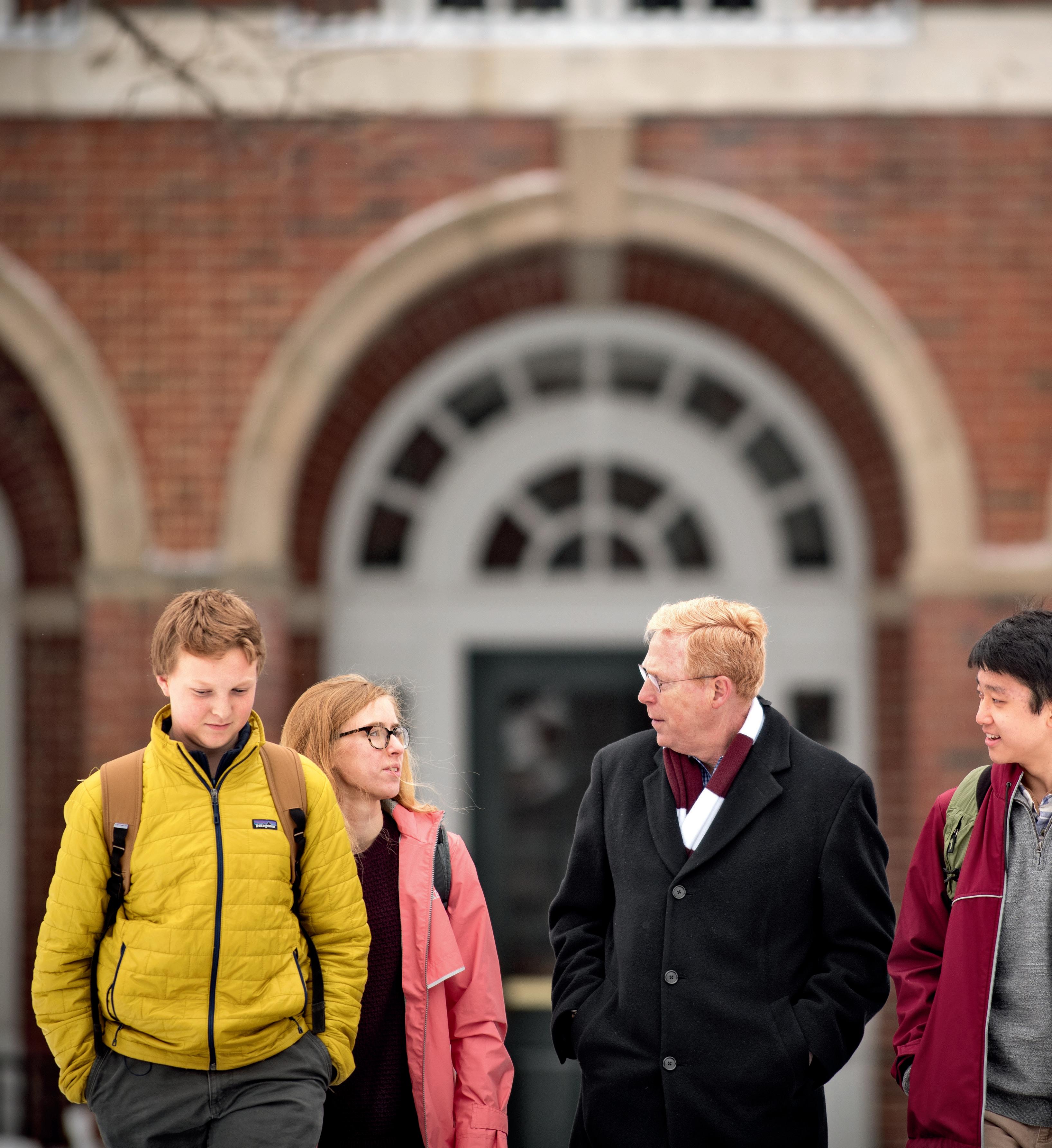
It’s simple. We admit students to Exeter without regard for their family’s ability to pay the tuition. The students who apply to — and eventually enroll at — Exeter tend to share a few qualities: They’re curious about pretty much everything. They love the process of learning as much as (maybe more than) the result. They’re independent-minded and community-oriented. They get inspired by friends and peers, and they appreciate the value of collaboration. They’re fascinating, kind, open-minded, openhearted people who are passionate about life.
When you are accepted to Exeter, we make sure your family can afford to say “yes.” We meet 100% of the demonstrated need of every admitted family. Families with incomes of less than $125,000 don’t pay any tuition at Exeter. All financial assistance comes in the form of grants, meaning there are no loans to pay back — we just want students to come and immerse themselves in every opportunity available to them. We are often able to provide additional financial support for textbooks, computers, off-campus study programs and other nontuition-related expenses.
We are excited to partner with you and your family. To learn more, visit www.exeter.edu, call us at 603-777-3437 or email admit@exeter.edu.
Aiden is an upper from Seattle, Washington. He’s a member of the soccer team, which has “improved a ton” and is full of “people I look up to.”
Caroline is a senior from Hampton, New Hampshire. She does a lot of work with ESSO, including Gal Pals, in which “female-identifying students work with women with disabilities. We’ll bake cookies or do karaoke. The women are so funny, so down-to-earth.”
Carson is an upper from Calispell, Montana. He had never heard of crew before he came to Exeter. This year, some friends invited him to try it, the coach encouraged him, and now he might do crew in the spring, because “it’s never too late to try something new.”
Cesar Zamudio graduated from Columbia University. At Exeter he founded GenEx, a group for firstgeneration students. He was inspired by the “amazing” musicians at Exeter: “I really valued the music there. I feel like I could listen to it for the rest of my life.”
Emilio is a senior from Washington, D.C. He founded the Meat Club and is the head of the Ski Club and co-head of an a cappella group, a dorm proctor, and a frequent loud spectator at his friends’ athletic contests.
Ingrid Bergill is a sophomore at Scripps College. She knows from firsthand experience that Principal Rawson is “shockingly good” at ping-pong.
Jake Calnan is a junior at Johns Hopkins. He loved the “warmth” of Exeter, “how I became lifelong friends with five people who had no shared interests, who I never would have known if I hadn’t come to Exeter.”
JD is a senior from Greenwich, Connecticut. He was captain of the varsity soccer team. One of his favorite classes was Religion and Popular Culture, “a class that addressed the broader world.”
Kaylee is an upper from Laurel, Maryland. She fondly remembers her prep year math class deciding to meet outside of class to make sense of difficult material. The moral of the story: “We’re all trying to succeed together.”
Leela is a prep from Lake Forest, Illinois. She was hesitant about joining The Exonian — “What if my writing’s not good enough?” — but did it anyway, and has already written three articles and is grateful for the guidance she’s received from older student writers.
Lydia is a lower from Gainesville, Virginia. She takes voice lessons and is involved with ESSO, Black Students of Excellence, and Transitions. Her room is decorated with “some K-pop posters, images of me and friends from prep year, and a flag of Ghana, which is where my parents immigrated from.”
Melanie Duenas is a senior at the University of Maryland. She loved “the level of intellectual curiosity” at Exeter, the feeling of “being surrounded by people who want to delve deeper.”
Michael is a prep from West Palm Beach, Florida. He described the combination of the people, the campus and the history of Exeter as “a perfect storm of awesomeness.”
Mr. Baseden is the director of Physical Education and Athletics. He has been a coach or administrator at the American School of Paris, the International School of Brussels and the Peddie School; and he’s a board member of Hoops for Hope.
Mr. Caldwell is an instructor in English, the head of Main Street dorm and was Exeter's first ninth grade program coordinator. Be sure to ask him about the time capsule ceremony that involved a song by Imagine Dragons.
Mr. Weatherspoon is a former dean of students, instructor in religion and girls basketball coach. He was at Exeter for more than three decades, which is why he refers to himself as “The Old Man and the School.”
Ms. Hernandez is an instructor in science, the head of Bancroft Hall, an adviser to the Biology Club, and a member of many committees that we need not mention here, but the point is that she throws herself into whatever she’s doing.
Petra is a lower from Ghent, New York. She loves the library: “It’s gorgeous. It’s a balance of academics and community. You’ll meet your friends there and do homework, but you’re excited about it.”
Rachael is a senior from Jeju, South Korea. She’s a fan of Outdoor Harkness, an oblong ring of comfy-ish stone slabs in front of Phillips Hall. “It shows how Harkness happens in and out of classes. All of our conversations are Harkness discussions.”
Renee is a senior from Columbus, Ohio. She plays French horn in the symphony orchestra and loves the dance and music concerts at the end of the semester. Her dorm is Amen Hall; the dorm chant is “Red hot!”
Sara Michaels is a senior at the University of Pennsylvania. As a prep, she was impressed by a tradition in her dorm called Senior Candlelight, in which seniors would reflect on their time at Exeter and share advice. She’s originally from Bangkok, Thailand.
Tommy is a senior from Santa Monica, California. He likes going into town to eat on weekends, and he’s taken the train to TD Garden to watch the Bruins. It can now be revealed that he nominated the soft-serve machine.
Note! We call first-year students “preps,” sophomores “lowers,” juniors “uppers,” and seniors (wait for it) “seniors.” We also call The Grill “Grill.” Somehow it all makes sense.
1,106 students from 42 countries and 44 states
80% boarding, 20% day
57% students of color
10% international students
100% need-blind admissions
About 45% of students receive financial aid
$56,135 average financial aid grant for boarding students
$37,770 average financial aid grant for day students
$0 tuition for students whose families have incomes of less than $125,000
12 students in the average class
450 courses
10 languages taught
8 faiths observed in Phillips Church
20 sports
150 clubs and organizations
100s of theater, music and dance opportunities
700-acre campus
10 miles from the Atlantic coast
5-minute walk to a train that takes you to Boston in less than 60 minutes
23,000 Exonians in our alumni network
Phillips Exeter Academy exeter.edu/admissions
603.777.3437 admit@exeter.edu